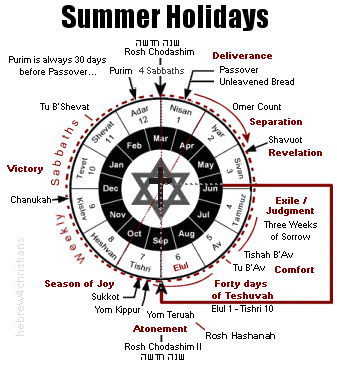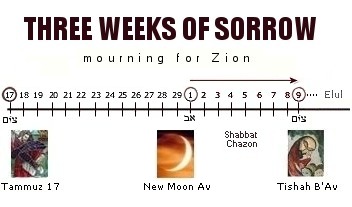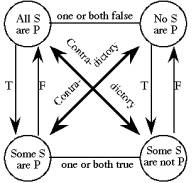|
Jewish Holiday Calendar
Note: For August 2016 site updates, please scroll past this entry....
In the summer there occurs a three week period of mourning that begins with the Fast of Tammuz and ends with Tishah B'Av. The last nine days of this three week period (i.e., from Av 1 until Av 9th) are days of increased mourning. However, after this somber time, the romantic holiday of Tu B'Av, the 15th of Av occurs. Summer ends with the 30 days of the month of Elul, a yearly season of teshuvah (repentance) that anticipates Rosh Hashanah and the fall holidays. The 30 days of Elul are combined with the first 10 days of the month of Tishri to create the "Forty Days of Teshuvah" that culminate with Yom Kippur.
Because they occur between the spring and fall holidays, the summer holidays help us prepare for the second coming of the Messiah:
The Summer Holidays:

Note that in accordance with tradition, holiday dates begin at sundown. Moreover, some holidays may be postponed one day if they happen to fall on the weekly Sabbath:
- Month of Tammuz (begins Tuesday, July 5th, 2016)
- Month of Av (begins Thursday, Aug. 4th, 2016)
- Month of Elul (begins Friday Sept. 2nd, 2016)
- Month of Tishri (begins Sunday, Oct. 2nd, 2016)
Note: Some calendars will list the first day of a holiday without indicating that the holiday actually begins sundown the night before... So, for example, while Tishah B'Av begins Saturday, August 13th at sundown, many calendars will indicate it occurs on Monday, August 14th...
August 2016 Updates
Note: If any page content appears to be missing, please refresh the page...
See the Blessing...

[ The following is related to our Torah reading for this week, parashat Re'eh.... ]
08.31.16 (Av 27, 5776) "See, I AM giving... the blessing (הַבְּרָכָה) when you hearken (i.e, shama: שָׁמַע) to the commandments of the LORD your God which I command you today" (Deut. 11:26-27). Do not understand this as referring to blessing that results from hearing God's word, but rather the blessing that enables you to hear it... It is the blessing of being made awake, alive, and attuned to the Spirit of God. In this world you may or may not receive material blessing as you heed the truth, though you assuredly will be sustained by God's ongoing care (Psalm 37:25). The heavenly blessing is always present before you, however, when you sincerely turn to God and seek to do his will. And may it please the LORD our God to help us turn to Him now, in this hour...
"Blessed be the God and Father of our our Lord Yeshua the Messiah, who has blessed us in Messiah with every spiritual blessing in the heavenly places" (Eph. 1:3). Note that the Greek text translated "with every spiritual blessing" (i.e., ἐν πάσῃ εὐλογίᾳ πνευματικῇ) does not refer to "merely spiritual" as opposed to substantial or material blessings, but rather the blessing given by the Holy Spirit, those powers and graces "in heavenly places" (ἐν τοῖς ἐπουρανίοις), that derive from the kingdom of God, which are the highest blessings of all.
Seek God and Live...

[ The following concerns the "Season of Repentance" leading up to the High Holidays... ]
08.31.16 (Av 27, 5776) The sages affirm, "This world is like a corridor before the World to Come; prepare yourself in the corridor, that you may enter into the hall" (Avot 4:21), which implies that the great commandment is always "seek Me and live" (Amos 5:4). "Seek the LORD while he may be found; call upon him while he is near" (Isa. 55:6). "Where can God be found?" asks the Kotzker rebbe, "but where one lets Him in..." God sometimes "hides" from us so that we are given the opportunity to seek Him with all our hearts.
כִּי כה אָמַר יְהוָה לְבֵית יִשְׂרָאֵל
דִּרְשׁוּנִי וִחְיוּ
ki · kho · a·mar · Adonai · le·veit · Yis·ra·el:
dir·shu·ni · vi·che·yu

For thus says the LORD to the house of Israel:
"Seek me and live!"
(Amos 5:4)

Download Study Card
God's Spirit is always calling for us to return to Him, to "seek God and live..." What is holding your heart back? In Hebrew teshuvah (תְּשׁוּבָה) means an "answer" to a to a shelah (שְׁאֵלָה), or a question. It is a response to the call of God... The One who ransomed us from death and offers us life in abundance is standing at the door knocking, waiting for us to respond to call (Rev. 3:20). During this season of teshuvah, may we all hear the Voice of Him who invites the brokenhearted to join him: "Come to me, all who labor and are heavy laden, and I will give you rest" (Matt. 11:28). Blessed is the LORD our Comforter....
The Struggle of Faith...

08.31.16 (Av 27, 5776) In our Torah reading for this week (parashat Re'eh) it is written: "You shall not worship the LORD your God in that way" (Deut. 12:4), which there refers to Canaanite practices of idolatry that were based on mystery and superstition. Unlike religious cults that were based on vain speculations, however, Jews are duty-bound to carry out God's will as expressed by the truth of divine revelation. Our father Abraham was given revelation of Torah (Gen. 26:5) and at Sinai moral truth was enshrined in the Ten Commandments (Exod. 24:12; Deut. 5:22). A basic assumption of Torah is that "ought implies can," or that we are genuinely responsible to know and to do moral truth. Unlike the ancient "mystery religions" that abandoned themselves by "celebrating" the lower nature, the Torah insists on overruling our base impulses and finding peace in the midst of the struggle to live in righteousness. Therefore we do not understand the Hebrew word "shalom" (שָׁלוֹם), or "peace," to simply mean the absence of strife, but rather "wholeness," "completeness," "healing" -- the integration of the heart and mind that comes through catharsis and personal struggle (Gen. 32:28). Faith does not mean passivity, but protest -- "arguing" for (and sometimes with) heaven, reminding God of his promises, lamenting over the divine absence; finding courage to oppose the status quo, and repeatedly appealing to heaven "be'khol levaveinu" (בְּכָל־לְבָבֵנוּ) -- with all our hearts -- precisely because we believe that our prayers can affect even the divine decrees... True faith confesses to "move mountains into the sea" (Mark 11:23) and refuses to let go of God until it receives the promised blessing to become "Israel" (Gen. 32:26).
Moving Heaven and Earth...

08.31.16 (Av 27, 5776) Act as if your choices have eternal significance; they do; pray as if your life depends on it; it does. Praying in accordance with the will of God - namely, for you to know God, to walk in the light of love, joy, peace; to be filled with wisdom, patience, kindness, and so on, will assuredly move heaven and earth (1 John 5:14). God is forever faithful and always hears those who call out to him with sincerity of heart: "The LORD is near to all who call on him, to all who call on him in truth."
קָרוֹב יְהוָה לְכָל־קרְאָיו
לְכל אֲשֶׁר יִקְרָאֻהוּ בֶאֱמֶת
ka·rov · Adonai · le·khol · ko·re·av
le·khol · a·sher · yik·ra·u·hu · ve·e·met

"The LORD is near to all who call on him,
to all who call on him in truth."
(Psalm 145:18)

The LORD listens when you pray... earnestly think about that for a moment. Act as if your choices have eternal significance; they really do; pray as if your life depends on it; it really does. Wake up; come alive! Let's boldly draw near to the throne of Grace to find help in our present hour of need (Heb. 4:16); let's cry out to God Most High (לֵאלהִים עֶלְיוֹן), to the very One who will fulfill his purpose for us (Psalm 57:2).
The Divine Light...
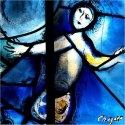
[ The following is related to this week's Torah reading, parashat Beha'alotekha... ]
08.31.16 (Av 27, 5776) "If I say, surely darkness covers me ... the night shines as the day; nothing hides from your radiance" (Psalm 139:11-12). We have to trust that God is in our darkness, in the silence, in the unknown... You come out of the shadows when you admit that you act just like other people, that you are human, in need of reconciliation yourself... Above all you need God. You need help. You need a miracle to help you to truly love. You may find excuses for many things, but you cannot escape the "wretched man that I am" reality that is grounded in your fears. God sees in the darkness and is present there, too. When you feel alone, like an unbridgeable gulf lay between you and all that is good; when you feel like you want to scream but are afraid that even then no one would hear, may the LORD shine His light upon you... Amen, may His light shine upon you.
גַּם־חשֶׁךְ לא־יַחְשִׁיךְ מִמֶּךָ
וְלַיְלָה כַּיּוֹם יָאִיר
כַּחֲשֵׁיכָה כָּאוֹרָה
gam · cho'·shekh · lo - yach·sheekh · mee·me'·ka
ve·lai'·lah · ka·yom · ya·eer
ka·cha'·she·khah' · ka·o·rah'

"The darkness is not made dark to you;
but the night shines as the day:
as the darkness so is the light...
(Psalm 139:12)

"For it is you who light my lamp; the LORD my God outshines my darkness" (Psalm 18:28). There is "depression," and there is the dark night of the soul, and these are different matters, though they may overlap... "Hope deferred makes the heart sick." The dark night of the soul is an experience of trusting God in the darkness yet has a spiritual direction and end. We walk through this darkness with God and learn from him even there...
Draw near in your need...

08.30.16 (Av 26, 5776) "Draw near to God, and he will draw near to you" (James 4:8). There are no conditions given here -- other than your raw need to connect with God for help. "Purify your hearts, you double-minded ones" (δίψυχοι, lit. "two-souled ones"); make up your mind and be unified within your heart: "How long will you go limping between two different opinions?" (1 Kings 18:21). You are invited to come; God has made the way; your place at the table has been set and prepared. "Let us draw near with a sincere heart in full assurance of faith (ἐν πληροφορίᾳ πίστεως), with our hearts sprinkled clean from an evil conscience and our bodies washed with pure water. Let us hold fast the confession of our hope without wavering, for he who promised is faithful" (Heb. 10-22-23).
Accounting for our souls...

[ The 40 day "Season of Teshuvah" begins Friday, September 2nd this year... ]
08.30.16 (Av 26, 5776) We are told: "Test yourselves to see whether you are in the faith" (2 Cor. 13:5). We are to courageously look at our lives and ask some tough questions. Do you really believe the truth, or are there other motives at work? Is it possible to think that you really believe when in fact you don't? For example, is it possible to think that you are a spiritual person who serves God, but you are mistaken? Tragically it seems that we can "talk ourselves into" believing that we are moral, honest, full of faith, and so on, but our self image does not agree with reality... This is more serious problem than hypocrisy (not believing what we say), since in this case we really do believe that we are something we are not – we are "true believers" in a distorted view of ourselves! This happens all the time. For instance, most people think they are "above average" in intelligence and have a high opinion of themselves. Self esteem is important, of course, but it must be grounded in reality: "For if anyone thinks he is something, when he is nothing, he deceives himself" (Gal. 6:3). Jesus warned, "On that day many (πολλοὶ) will profess to me, 'Lord, Lord, did we not prophesy in your name, and cast out demons in your name, and do many mighty works in your name?' And then will I profess to them, 'I never knew you; depart from me, you workers of lawlessness'" (Matt. 7:22-23). How is such a dreadful outcome possible unless truly religious people can indeed truly fool themselves? By itself, sincerity is no measure of truth, since we can truly sincere, and yet sincerely wrong...
This is a sobering message, friends. We are not to live in fear, though we are indeed to regularly engage in cheshbon hanefesh, to account for the state of our souls (1 Cor. 11:31). We are often people of "little faith" (Matt. 8:26), and sometimes the only honest thing is to plainly confess, "Lord, I believe; help my unbelief!" (Mark 9:24). As it is written: "The LORD is near to all who call on him, to all who call on him in truth" (Psalm 145:18). We find strength by trusting in love and kindness of God for our eternal good. It is written: "This is the confidence (παρρησία) that we have with Him, that if we ask anything according to His will, he hears us. And if we know that He is hearing us, we also know that He will fulfill the petition of our heart" (1 John 5:14-15). What does God want for you but to know his love? He wants you to walk in the truth, full of love, joy, peace, patience, having a sound mind, free of anxiety, and free of interference from the demonic. We can confidently ask Him for these things because such are assuredly His will for our lives.
Note: Some examples of self-deception include: thinking you are truly humble; regarding yourself as honest or "real"; saying you will pray for someone but "forgetting to do so"; sharing a "prayer concern" for another as a pretext to gossip; thinking you have courage but shrinking away from truth that threatens your self-esteem; thinking you always have to be right or have all the answers; claiming that you are "hearing from God" or that you speak on behalf of the LORD God Almighty (when its clear that you don't); evading responsibility for the needs of other people (including your enemies); blaming others for your problems; pretending that you are thinking for yourself when you are parroting other people's thoughts; flattering yourself that you and God are "buddies" and that He will defend your sinful attitudes, false prophecies, etc. May God help us turn to Him in the truth...
The High Holidays Psalm...
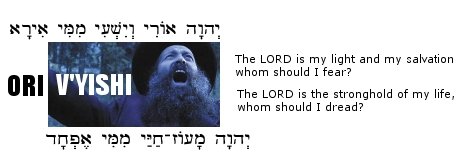
08.30.16 (Av 26, 5776) It is an old custom to read (or to sing) the Book of Psalms during the month of Elul. In the famous Song of Moses, it is written: וַיּאמְרוּ לֵאמר אָשִׁירָה לַיהוָה / "and they spoke, saying: 'I will sing to the LORD' (Exod. 15:1). This phrase can be formed into an acronym for Elul (אלול), and the sages therefore reasoned that hearing the Psalms were vital during the Season of Repentance and Days of Favor.
Of all the great Psalms, however, Psalm 27 is considered the central one of the season of teshuvah. The midrash on the Psalms states that the word ori (אוֹרִי), "my light," refers to Rosh Hashanah (based on Psalm 37:6) whereas the word yishi (יִשְׁעִי), "my salvation" (lit. "my Jesus") refers to the atonement given on Yom Kippur. King David also mentions that God would hide him in his sukkah (בְּסֻכּה) in the time of trouble, referring to the holiday of Sukkot (Psalm 27:5). Therefore since it alludes to all three of the fall holidays, Psalm 27 is regarded as the thematic Psalm for the High Holidays of the Jewish year.
יְהוָה אוֹרִי וְיִשְׁעִי מִמִּי אִירָא
יְהוָה מָעוֹז־חַיַּי מִמִּי אֶפְחָד
Adonai · o·ri · ve·yish·i · mi·mi · i·ra
Adonai · ma·oz · chai·yai · mi·mi · ef·chad

"The LORD is my light and my salvation; whom shall I fear?
The LORD is the stronghold of my life; of whom shall I be afraid?" (Psalm 27:1)

Hebrew Study Card
Finally, Psalm 27:13 contains a textual oddity. It is often translated: "Unless I had believed to see the goodness of the Lord in the land of the living." The word often translated "unless" is lulei (לוּלֵא), which read backwards spells Elul (אלול). This is said to suggest that salvation comes from faith that sees the goodness of the LORD. Repentance is only really possible if we believe in the goodness and love of the Lord "in the land of the living."
God's Overmastering Power...

08.30.16 (Av 26, 5776) Though it might sometimes seem that evil has the upper hand in this fallen world, we must remember that the LORD God Almighty is in complete control and works all things together for our good - even overturning the schemes of the wicked for our ultimate benefit. The devil thought he had won a great victory when Yeshua died upon the cross, but God utterly vanquished his evil intent by raising Messiah from the dead and exalting Him as the matchless Ruler over all principalities, powers, and kings of earth (Rev 1:5). Ein od milvado (אֵין עוֹד מִלְבַדּו) - there is no power apart from God. Everything is in His hands, and He alone is the keyholder of hell and death (Rev. 1:18). "Hallelujah! For the Lord our God, the Almighty One, reigns." Therefore the LORD asks your anxious heart: "Behold, I AM the LORD, the God of all flesh. Is anything too difficult for me?"
הִנֵּה אֲנִי יְהוָה אֱלהֵי כָּל־בָּשָׂר
הֲמִמֶּנִּי יִפָּלֵא כָּל־דָּבָר
hee·nei · a·nee · Adonai · E·lo·hey · kol–ba·sar
ha·mee·me'·nee · yee·pa·lei · kol · da·var

"Behold, I am the LORD, the God of all flesh.
Is anything too difficult (or wonderful) for me?"
(Jer. 32:27)
Hebrew Study Card

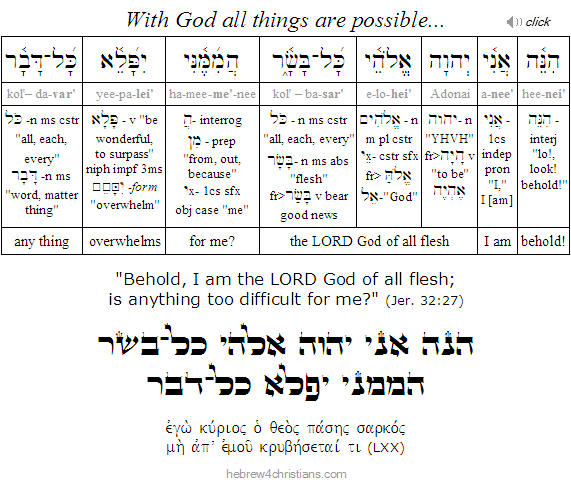
As it is written in the psalms: "For the LORD Most High (יְהוָה עֶלְיוֹן, lit., "the ascended LORD") is to be feared; for He is the great king over all the earth" (Psalm 47:2).
Appearance and Reality...
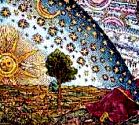
08.29.16 (Av 25, 5776) The Hebrew word for "world" or "age" is olam (עוֹלָם), which is derived from a root verb (עָלַם) that means "to conceal" or "to hide." God "hides" His face from us so that we will seek Him, and that means we must press through ambiguity to earnestly take hold of divine truth. Centuries before the time of the philosopher Plato, King David proclaimed that there was a "divided line" between the realm of the temporal world and realm of the hidden and eternal world. The temporal world is finite, subject to change, yet pointed beyond itself to an eternal world, which was the source of real significance, meaning, and life itself (2 Cor. 4:18). Therefore King David said, בַּקְּשׁוּ פָנָיו תָּמִיד/ bakeshu fanav tamid: "Seek His face continually" (Psalm 105:4). Note that the numerical value for the word "fanav" (i.e., "His face") is the same as that for the word "olam." When we truly seek God's face (i.e., His Presence) we are able to discern the underlying purpose for our lives.
דִּרְשׁוּ יְהוָה וְעֻזּוֹ
בַּקְּשׁוּ פָנָיו תָּמִיד
dir·shu · Adonai · ve·u·zo
ba·ke·shu · fa·nav · ta·mid

"Seek the LORD and his strength;
seek his presence continually."
(Psalm 105:4)
ζητήσατε τὸν κύριον καὶ κραταιώθητε
ζητήσατε τὸ πρόσωπον αὐτοῦ διὰ παντός

Download Study Card
Note that the ancient Greek version of the Torah (i.e., the Septuagint) translates this verse as, "Seek the LORD and be strengthened; seek His face through everything (διὰ παντός)." Unlike Plato, however, who "saw through" the temporal world and regarded it as less than real, King David understood that how we live within the intersection of these two realms revealed our inner character of faith -- and therefore our ultimate destiny....
Note: The sages point out that the word for "forever," "le'olam," is spelled so that it can be read "to conceal" (in Hebrew, "le'aleim"), meaning that the Name of God is "hidden," too. "This is my name - forever!" meaning, my Name YHVH is forever a mystery...
Numbering our Days...
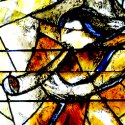
08.29.16 (Av 25, 5776) Time seems short, and the days and weeks pass so quickly now... LORD, help us to see what is most worthwhile, to focus on what has eternal significance. Keep us from distraction, from failing to make time to listen for your voice or from recognizing your presence. As Moses prayed, "Teach us to number our days that we might get a heart of wisdom..."
It is said, "Repent one day before you die." But who knows the day of one's death in advance? Therefore let us live each day as if it were to be our last, and let us live with reverent joy and fearful hope.... It's only when we understand we have a limited time on earth, and that "no man knoweth the day or the hour" when their time is up, that we begin to live each day as if it were the only one we really have... For every man the "end of this world" is the day of his death, the Day of Judgment. Therefore, again, as Moses prayed, "teach us to number our days that we may get a heart of wisdom..."
לִמְנוֹת יָמֵינוּ כֵּן הוֹדַע
וְנָבִא לְבַב חָכְמָה
lim·not · ya·me·nu · ken · ho·da
ve·na·vi · le·vav · chokh·mah

"Teach us to number our days
that we may get a heart of wisdom."
(Psalm 90:12)

Download Study Card
Moses' petition surely is not the request that we are enabled to literally count the remaining days of our lives (as if that would help us, anyway), since God does not disclose the day of one's death (though he can teach us how to die well). On the contrary, to "number our days" means first of all to account them in relation to Eternity and to esteem them as both infinitely vain and infinitely precious. In other words, Moses asked that the LORD God would teach us how to make our days count for eternity, to have a weight of glory that will shine forth in the world to come. Living in the awareness of both the frailty of life as well as its eternally enduring significance is to acquire a heart of wisdom, since fleeting moments - and what we choose to do with them - are the very means by which we prepare ourselves for the world to come and our future with the LORD. Indeed, this explains why Moses ends his appeal by asking the LORD: "Let the splendor of the Lord our God be upon us, and establish the work of our hands upon us; yes, establish the work of our hands!"
Despite the frailty and tenuous brevity of our days, may it please the LORD God to shine the power of His radiance upon us, and to establish our works for His praise. May He help us to "number our days" so that we may obtain levav chokhmah (לְבַב חָכְמָה) - a heart of wisdom to live according to His will (James 1:5). Above all else, may the "God of our Lord Yeshua the Messiah, the Father of Glory (אֲבִי הַכָּבוֹד), impart to you a spirit of wisdom and of revelation in the knowledge of Him (רוּחַ הַחָכְמָה וְהֶחָזוֹן לָדַעַת אתוֹ), having the "eyes of your hearts" (ὀφθαλμοὺς τῆς καρδίας) enlightened, that you may know what is the hope to which he has called you" (Eph. 1:17-18). May you be strong, resolute, and fully focused on our LORD, and may God make this real for us: Amen.
Sustained by His Presence...

08.29.16 (Av 25, 5776) The sages admonish: Da Lifnei mi attah omed – "Know before whom you are standing," by which they seek to remind you that right now – in this very moment – you live, move, and have your being by the agency and will of the Most High. Fearing the LORD means understanding that all of creation is imbued with the Divine Presence, and that "the whole world is filled with His glory..." (Isa 6:3). Since all of life is sacred, we must therefore respect the environment, treat animals with kindness, and to regard other people with honor and dignity as image-bearers of God.
קדוֹשׁ קָדוֹשׁ קָדוֹשׁ יְהוָה צְבָאוֹת
מְלא כָל־הָאָרֶץ כְּבוֹדוֹ
ka·dosh · ka·dosh · ka·dosh · Adonai · tze·va·ot
me·lo · khol · ha·a·retz · ke·vo·do

"Holy, holy, holy is the LORD of hosts;
the whole earth is full of his glory!"
(Isa. 6:3)

Download Study Card
The sages note that kedoshim, the holy ones, are those who have abandoned this world for the sake of the world to come – they no longer strive for wealth, fame, power, or other fleeting pleasures of this world. Because they separate themselves from the world for fear of sinning (i.e., missing the apprehension of God's glory and the Divine Presence in their lives because of lesser fears that enslave them), they may resemble the nazir who abstains from wine, lets his hair grown wild, and keeps from contact with death, though the Jewish ideal is not monastic experience but rather holiness within daily life itself... To the kedsohim the LORD speaks: Do not be concerned about your daily bread... Who then is truly rich? The one who stores up treasure in heaven, who is content with his lot in this life, and who accepts all things that happen to him as for his good... "Do good, O LORD, to the good, and to them that are upright in heart" (Psalm 125:4), which means that the good that is done by God is spiritual - "in their hearts." "There is no want to those who fear Him," no inner deficiency (חָסֵר), meaning that the fear of the LORD provides inner food of the Spirit ("I have bread that you know not of," said Yeshua). As it is written in the following verse: "The young lions lack and suffer hunger, but they that seek the LORD lack no good thing" (34:10).
Forty Days of Teshuvah...

[ The month of Elul begins this coming Shabbat, chaverim... That means it is time to think ahead and to begin preparing for the coming fall holidays... ]
08.29.16 (Av 25, 5776) The last month of the Jewish calendar (counting from Tishri) is called Elul (אֱלוּל), which begins Friday, Sept. 2nd (at sundown) this year (i.e., Shabbat). Traditionally, Rosh Chodesh Elul marks the beginning of a forty day "Season of Teshuvah" that culminates on the solemn holiday of Yom Kippur. The month of Elul is therefore a time set aside each year to prepare for the "Days of Awe," by getting our spiritual house in order.
During this time we make additional effort to repent, or "turn [shuv] toward God." In Jewish tradition, these 40 days are sometimes called Yemei Ratzon (יְמֵי רָצוֹן) - "Days of Favor," since it was during this time that the LORD forgave the Jewish nation after the sin of the Golden Calf (Pirke d'Reb Eliezar). Some of the sages liken these 40 days to the number of days it takes for the human fetus to be formed within the womb.
Rosh Hashanah will begin in about five weeks (i.e., Sunday, Oct. 2nd at sundown). During the time leading up to the High Holidays, it is customary to engage in cheshbon ha-nefesh ("soul searching") and to derive special comfort that God is forgiving and loving to those who sincerely turn to Him. The Jewish sages chose the seven "Haftarot of comfort" to encourage us to make our hearts ready for the upcoming High Holiday Season.
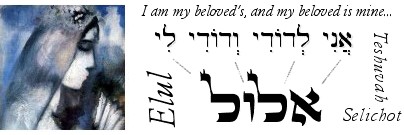 |
Note that the word "Elul" (אֱלוּל) may be read as an acronym for the phrase, ani le'dodi ve'dodi li (אֲנִי לְדוֹדִי וְדוֹדִי לִי), "I am my beloved's, and my beloved in mine" (Song 6:3), to encourage us to return to God, to become full of desire for the Beloved of our soul...
Shuvah Yisrael ad Adonai Elohekha: "Return, O Israel, to the LORD your God..." (Hos. 14:1). The sages say you must return to the place where the LORD is your God -- that you receive his acceptance and love, and that you reclaim your status as his beloved child...
The following (simplified) blessing can be recited to ask the LORD to help you prepare for the month of Elul and the forty day "Season of Repentance":
יְהִי רָצוֹן מִלְּפָנֵיךָ יהוה אֱלהֵינוּ וֵאלהֵי אֲבוֹתֵינוּ
שֶׁתְּחַדֵּשׁ עָלֵינוּ חדֶשׁ טוֹב בַּאֲדנֵינוּ יֵשׁוּעַ הַמָּשִׁיחַ אָמֵן
ye·hi · ra·tzon · mil·fa·ne·kha · Adonai · E·lo·hei·nu · ve·lo·hei · a·vo·tei·nu
she·te·cha·desh · a·lei·nu · cho·desh · tov · ba'a·do·nei·nu · Ye·shu·a · ha·ma·shi·ach · A·men

"May it be Your will, LORD our God and God of our fathers,
that you renew for us a good month in our Lord Yeshua the Messiah. Amen."

Download Study Card
Parashat Re'eh - ראה
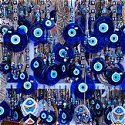
08.28.16 (Av 24, 5776) Our Torah portion this week (i.e., parashat Re'eh) begins, "See (רְאֵה), I give before you today a blessing and a curse: the blessing (הַבְּרָכָה), if you obey the commandments of the LORD your God, which I command you today, and the curse (הַקְּלָלָה), if you do not obey the commandments of the LORD your God, but turn aside from the way that I am commanding you today, to go after other gods that you have not known" (Deut. 11:26-28). We obtain God's blessing (i.e., berakhah: בְּרָכָה) when we obey Him, and our decision to obey manifests the blessed state of walking before the Divine Presence (the direct object marker et (את) before the word "the blessing" alludes to the blessings of "Aleph to Tav," that is from Yeshua, as described in Lev. 26:3-13). As King David said, "I have set (שִׁוִּיתִי) the LORD always before me..." (Psalm 16:8). David made a choice to "set" the LORD before his eyes, for he understood that opening his eyes to Reality was the only path of real blessing.
On the other hand, we obtain God's curse (i.e., kelalah: קְלָלָה) when we close our eyes and "forget" that the LORD is always present.... Suppressing God's truth invariably leads to idolatry, that is, to self exaltation. Note that the root word for the word "curse" (kalal) means to be treated as of little account, and therefore "ratifies" the rebellious heart's attitude toward God. This is middah keneged middah - we are ignored by the LORD as we ignore Him, just as we seen by Him when we truly seek His face (Isa. 55:6-7). So we see that the blessing or the curse really comes from our own inward decision, and God establishes the path we have chosen. As King David said, "God supports my lot" (Psalm 16:5), and Solomon wrote, "The heart of man plans his way, but the LORD directs his steps" (Prov. 16:9).
Note: The third of the "Seven Weeks of Comfort" leading up to Rosh Hashanah is called Aniyah so'arah (עֲנִיָּה סעֲרָה, "O afflicted and storm-tossed one"), which reminds the Jewish people of God's eternal and unconditional covenant of peace. Indeed of the Jewish people it is said, "no weapon that is fashioned against you shall succeed, and you shall refute every tongue that rises against you in judgment." Therefore the LORD invites the people to drink freely from the waters of life: "Incline your ear, and come to me; hear, that your soul may live; and I will make with you an everlasting covenant (בְּרִית עוֹלָם), my steadfast, sure love for David (Isa. 55:3; Luke 1:68-75; Acts 13:34).
The Exchanged Life...

08.26.16 (Av 22, 5776) If then you have been raised with Messiah, seek the things that are above, where the Messiah is seated at the right hand of God (לִימִין הָאֱלהִים); focus your thoughts on the things above - not on things here on earth - for you have died, and your life has been hidden with Messiah in God" (Col. 3:1-3). Note that the verb translated "you have died" (ἀπεθάνετε) indicates that your death is a spiritual reality you must accept by faith. You don't "try to die" to the flesh, since that is the fool's errand of man's "religion." No, you trust that God has killed the power of sin and death on your behalf and imparted to you a new kind of life power (John 1:12; Eph 2:5). Because you partake of an entirely greater dimension of reality, namely, the spiritual reality hidden from the vanity of this age, your life is likewise hidden from this world (Col. 3:4). Therefore we are instructed to consciously focus our thoughts (φρονέω) on the hidden reality of God rather than on the superficial and temporal world that is passing away: "For we are looking not to the things that are seen but to the things that are unseen. For the things that are seen are transient (i.e., "just for a season," καιρός), but the things that are unseen are eternal" (2 Cor. 4:18).
Just as you must trust and accept that Yeshua was crucified for you, identifying with you, taking your place in judgment, exchanging his life for your own, so you must trust and accept that you have been crucified with him, and that your old life was taken away and replaced with a new, indestructible nature. In other words, a union is created where his "for me" is answered by my "with him." Χριστῷ συνεσταύρωμαι– "I already have been crucified in Messiah" (Gal. 2:20). Indeed the two go together: to trust in the finished work of Messiah for you is to trust in his finished work within you... When he died on the cross for you, which sins didn't he bear on your behalf? which remedy did he leave unfulfilled?
Shabbat Shalom chaverim... May you be filled with all the blessings and power secured for you by our Messiah Yeshua, blessed be He. We remember you all in our prayers!
Victory in Brokenness...

08.26.16 (Av 22, 5776) Rashi states that the "wooden ark" mentioned in this week's Torah portion (see Deut. 10:1) was later used in Israel's wars. At the outset of a battle, the kohanim (priests) would accompany this "war ark" ahead of the army while the Levites would blast shofars and sing praises to the LORD. The midrash states that the war ark held the tablets that were shattered after the sin of the Golden Calf, whereas the second ark, made by Betzalel, held the unbroken tablets in the Holy of Holies of the Tabernacle (Exod. 37:1). Perhaps the purpose of bringing the broken tablets to the battle was to remind us that even as we battle against evil, we must do so in humility, conscious of our own inner brokenness, and relying solely upon God's power for the victory...
The Idolatry of Rage...

08.26.16 (Av 22, 5776) We are commanded not to destroy ourselves by allowing bitterness, anger, or fear to consume our hearts. In our Torah portion this week we read: "And you shall not bring an abominable thing (תּוֹעֵבָה) into your house and become devoted to destruction like it" (Deut. 7:26). In his comment on this verse, Abraham Twerski quotes the Mishnah that says if someone goes into a rage, it is equivalent to idol worship, and therefore such should never be brought into the home. Indeed, rage is linked with avodah zarah - idolatry - because it exalts the ego and claims that the Lord can't (or won't) help you in your moment of testing or need. The Scriptures are clear, however, that "there is no test given to you that you cannot handle with God's help" (1 Cor. 10:13), and we are invited to come boldly before the Divine Presence to find such help in our time of need (Heb. 4:16). Believing that you can't overcome your fear or anger problem is therefore a form of idolatry. As is written: Lo yiheyeh vekha el zar (לא־יִהְיֶה בְךָ אֵל זָר) -- "there shall be no foreign god within you" (Psalm 81:9), which means that we must expressly deny the ego's demand to have its will be done. Being full of a sense of self-importance is to be enslaved to vanity and to have a foreign god "within you." God will indeed help us if we ask according to his will (1 John 5:14-15). Blessed are You, Lord our God, who delivers us from self-destruction.
The Bread of Life...

[ The following is related to our Torah reading for this week, parashat Eikev.... ]
08.26.16 (Av 22, 5776) Our Torah portion for this week includes the famous statement: "Man does not live by bread alone (על־הַלֶּחֶם לְבַדּוֹ יִחְיֶה הָאָדָם), but from everything that comes from the mouth of the LORD shall he live" (Deut. 8:3). Note that Yeshua quoted this verse when he was tested with physical hunger in the wilderness (Matt. 4:3-4). Eating is inherently a sacrificial act: We must "eat life" in order to live.... But while physical food helps us survive, we must ask the question, for what end? Do we live for the sake of eating (and thereby live to eat for another day, and so on), or do we eat in order to live? If the latter, then what is the goal of such life? What is the source of its nutrient and where is it taking you? What does your soul or "inner man" feed upon to gain the spiritual will to live?
כִּי לא עַל־הַלֶּחֶם לְבַדּוֹ יִחְיֶה הָאָדָם
כִּי עַל־כָּל־מוֹצָא פִי־יהוה יִחְיֶה הָאָדָם
ki · lo · al-ha·le·chem · le·va·do · yich·yeh · ha·a·dam;
ki · al-kol-mo·tza · fi-Adonai · yich·yeh · ha·a·dam

"Man does not live on bread alone, but by everything that comes
from the mouth of the LORD does man live" (Deut. 8:3)

Hebrew Study Card
Both the written Torah and Yeshua (who is the true embodiment and expression of Torah) attest that we receive sustenance from the Word of God (דְּבַר הָאֱלהִים), the Source of spiritual life. But the word of God itself expresses the message of the very love of God (אַהֲבַת הָאֱלהִים) that always sustains us -- whether we are conscious of this or not. After all, for those of us who understand our brokenness and radical dependence for deliverance from ourselves, what "word" could we possibly endure were it not His words of hope, consolation, and even endearment? The Love of God is our life, chaverim, and the love of God is most clearly seen in the life and sacrificial death of Yeshua the Messiah...
May we always remember that our very spiritual life -- its source and its end -- depends upon receiving the word of the Living God who is King of Eternity (אֱלהִים חַיִּים וּמֶלֶךְ עוֹלָם). He is the Bread of our Life (לֶחֶם הַחַיִּים) who speaks life-giving words of hope and love to all who will attend themselves to His Presence.
Religion vs. Spirituality...

[ The following is related to our Torah reading for this week, parashat Eikev.... ]
08.26.16 (Av 22, 5776) It has been wisely said that "religion is for people afraid of going to hell; spirituality is for those who have been there...." Religion seeks defense of the ego and delights in the idea of personal reward; spirituality seeks death of the ego and delights in the idea of shared love... Studying the Scriptures for the sake of "religion" is ultimately self-defeating, since the answer is not religion but spiritual rebirth: "Truly, truly, I say to you, unless one is born again he cannot see the kingdom of God" (John 3:3).
"Circumcise your hearts," our Torah says, "and be no longer 'difficult' (i.e., לא תַקְשׁוּ עוֹד) [Deut. 10:16]. Find a way to feel, to care, to sympathize once again... "It is enough to open your heart the smallest amount - even the width of a pin head - to repent, so that you feel a prick within your heart, like a piercing sting in living tissue, not like a needle thrust into dead flesh" (Menachem Mendel of Kotzk).
וּמַלְתֶּם אֵת עָרְלַת לְבַבְכֶם
וְעָרְפְּכֶם לא תַקְשׁוּ עוֹד
u·mal·tem · et · or·lat · le·vav·khem
ve·or·pek·hem · lo · tak·shu · od

"Circumcise therefore the foreskin of your heart,
and be no longer difficult."
(Deut. 10:16)

Making Room for Wonder...

[ The following is related to our Torah reading for this week, parashat Eikev.... ]
08.25.16 (Av 21, 5776) From our Torah portion this week (i.e., parashat Eikev) we read: "And now, Israel, what does the LORD your God require of you, but to fear the LORD your God, to walk in all his ways, to love him, to serve the LORD your God with all your heart and with all your soul, and to keep the commandments and statutes of the LORD, which I am commanding you today for your good?" (Deut. 10:12-13). Ultimately we must make the choice whether we will respect life or not, and that is the question before us... In this present world, God "hides" so that people may seek him (Isa. 45:15; Matt. 13:10-15). The voice of conscience may be suppressed and the revelation of nature ignored; moreover, some things are perceived only if they are looked for in the right way, and the Divine Presence is not apprehended apart from humility and reverence. We must "make room" for wonder; we must open the "eye of the heart" to see what is greater than our everyday vision. "It is good to look at the sky often, as this helps develop the awe of God." Indeed the word for fear, yirah (יִרְאָה), is connected with the word for seeing, ra'ah (רָאָה). When we really see life as it is, we will be filled with wonder over the glory of it all. Every bush will be aflame with the Presence of God and the ground we walk upon shall suddenly be perceived as holy (Exod. 3:2-5). Nothing will seem small, trivial, or insignificant. In this sense, "fear and trembling" (φόβοv καὶ τρόμοv) before the LORD is a description of the inner awareness of the sanctity and eternal significance of life itself (Psalm 2:11, Phil. 2:12).
The fear of God is paradoxical. One verse teaches the fear of the Lord (i.e., his power), another teaches the "fear not" love of the Lord (i.e., his grace). We are drawn to God in adoration, appreciation, wonder, and love, and yet we are compelled to shrink back because of His overwhelming power, glory, holiness, and radiance. Therefore we see "the disciple whom Jesus loved" both leaning on his chest but also falling on his face in "dreadful adoration" (John 13:23; Rev. 1:17). Only when these heart attitudes are combined is the heart balanced. But the fear of the Lord is primary (see Psalm 110:10; Prov. 1:7, 9:10), and when we walk in it, we are released from the ordinary fears of men by apprehending a far surpassing power that overrules all things. Again, it is a paradox: if we fear lesser things we lose sight of the awe of God; but if we first revere God, we will lose sight of lesser fears.
In Jewish tradition, seeing the Presence of God in all things is called yirat ha-rommemnut (יִרְאַת הָרוֹמְמוּת), or the "Awe of the Exalted." We might get a sense of this reverential awe when we behold the canopy of stars in the night sky, or when we look down from atop a mountain peak, or when we catch site of a spectacular sunset. Or we might experience it during the birth of a baby or the death of a loved one... This sense of awe or "transcendent mystery" is also called yirat Adonai (יִרְאַת יְהוָה), the "fear of the Name." It presents a holy hush, a feeling that you are standing before something utterly wonderful, sacred, set apart, mysterious, and profoundly significant; it both attracts yet causes you to draw back...
Our Ultimate Concern...
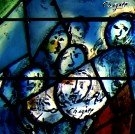
08.25.16 (Av 21, 5776) What you fear says a lot about you, since fear is closely linked to what we value and ultimately worship... All the world is lit up with the radiance of God our Savior. Fearing lesser things blinds us to the truth of Reality and glorifies the realm of darkness. The world system is based on slavery to such lesser gods and fears, but we are to walk in the awe of the LORD God Almighty alone, and the light of his reverence overcomes the fear of this world. As the Gerer Rebbe said: "If a man has fear of anything except the Creator, he is in some degree an idolater. For to fear is to offer worship to the thing feared, and this form of worship may be offered only to the LORD."
אֶת־יְהוָה אֱלהֶיךָ תִּירָא
וְאתוֹ תַעֲבד וּבִשְׁמוֹ תִּשָּׁבֵעַ
לא תֵלְכוּן אַחֲרֵי אֱלהִים אֲחֵרִים
מֵאֱלהֵי הָעַמִּים אֲשֶׁר סְבִיבוֹתֵיכֶם
כִּי אֵל קַנָּא יְהוָה אֱלהֶיךָ בְּקִרְבֶּךָ
et · Adonai · E·lo·he·kha · ti·ra
ve·o·to · ta·a·vod · u·vish·mo · ti·sha·vei·a
lo · te·le·khun · a·cha·rei · e·lo·him · a·cha·rim
me·elohei · ha·a·mim · a·sher · se·vi·vo·tei·khem
ki · el · kan·na · Adonai · E·lo·he·kha · be·kir·be·kha

"It is the LORD your God whom you shall fear.
Him you shall serve and by his name you shall swear.
You shall not go after other gods,
the gods of the peoples who are around you
for the LORD your God in your midst is a jealous God."
(Deut. 6:13-15)
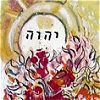
The fear of the Lord, yirat HaShem, is reverent awe and wonder that resembles the great trembling of love: "With this ring I do worship thee..." The Scriptures repeatedly state that this fear is reishit chockmah (רֵאשִׁית חָכְמָה) – the "beginning of wisdom" and the foundation of all true godliness and obedience.... Sin always entices us to fear the "lesser gods"; it seduces us to live in arrogance, pride, anger, envy, lust, despair, and so on. Sin expresses the opposite of godly reverence and seeks to justify cowardly indolence so that people learn to actually "love" and defend what enslaves them...
Fearing lesser gods is an affront to the glory and majesty of our Savior. We are commanded to be full of courage given by God's own spirit: It is the Lord who goes before you. He will be with you; he will not leave you or forsake you. Do not fear or be dismayed" (Deut. 31:8). "Have I not commanded you? Be strong and courageous. Do not be frightened, and do not be dismayed, for the Lord your God is with you wherever you go" (Josh. 1:9).
The fear of the LORD expresses the power of faith to repel the schemes and designs of the devil. Then Yeshua said to him, "Be gone, Satan! For it is written, 'You shall worship the Lord your God and him only shall you serve'" (Matt. 4:10). "Submit yourselves therefore to God. Resist the devil, and he will flee from you" (James 4:7). Ultimately, the fear of the LORD is a great gift, the underlying motive of all true teshuvah (repentance).
When the people heard the Voice of the LORD thundering at Mount Sinai, they drew back in fear and appealed to Moses to be their mediator: "You speak with us and we will listen, but let not God speak with us, for we might die" (Exod. 20:19). Moses replied, "Do not be afraid, for God came in this way to test you and in order that His fear should remain before you, so that you do not sin" (Exod. 20:20). The point of fearing God, then, is to keep us from what separates us from the love of God. The Kotzker Rebbe commented: "When Moses exhorted the people not to be afraid, he meant that the fear "for we might die" was not what God wants from us. Rather, God desires that the fear of Him should remain before you so that you do not sin. That is the only true fear of heaven." The "fear of the LORD" is that we might lose sight of what we really need for life...
Love's Fear and Trembling...

08.25.16 (Av 21, 5776) When people "walk in love," they seek ways to mutually respect, affirm, and honor each other, and they are careful not to wound the relationship through selfishness or strife. The fear of losing love evokes a healthy zeal to protect it from loss... The same may be said of God's relationship with us. The gospel represents God's passion for us, the call of his heart, his desire to elevate us to the role of the beloved, and we respond by accepting Him as the Lover of our souls, the ultimate concern of our life. Sin threatens to seduce us away from God's love, to interfere with our relationship, which evokes God's "jealousy" to protect love from loss. It is written that "perfect love casts out fear" (1 John 4:18), but perfect love (τελεία ἀγάπη) must be "perfect," that is, reciprocal, complete, consummated, and alive with passion. In Hebrew, perfect love is "shalem" - that is, whole, healed, and unified (אַהֲבָה שְׁלֵמָה). Perfect love is both given and received... It is not "perfect love" to objectively accept that God loves you in Yeshua. No, you must receive this as an inward passion, you must live within it, must embrace it, take possession of it, and let it fill your heart to abundance. This love, this "perfect love," then will cast away your fear of being unwanted, rejected, and abandoned. But to know this love, you have to open your heart and accept it as your own, the essential reality of who you are as "beloved":
אֲנִי לְדוֹדִי וְעָלַי תְּשׁוּקָתוֹ
a·ni · le·do·di · ve·a·lai · te·shu·ka·to

"I am my beloved's, and his desire is for me"
(Song 7:10)

We are told to "work out our salvation with fear and trembling" (μετὰ φόβου καὶ τρόμου) since the love of God demands no less than our all of our heart, soul, mind and strength.
Guard your Heart Carefully...

08.24.16 (Av 20, 5776) "Therefore watch yourselves very carefully..." (Deut. 4:15). Just as we guard against sickness of the body, so we must guard the soul. Making a "graven image" of God means more than literally creating an idol or a "representation" of something fixed and finite; indeed, the presence of the idol symbolizes the negation of the Mystery, the Ineffable and Sacred Glory that pervades the creation (Exod. 15:11; 1 Sam. 2:2; Isa. 6:3). The Torah indicates that idolatry "disfigures" the soul itself (מִשְׁחַת), creating an inner spiritual perversion that blinds the awareness of reality. In its essence, idolatry is any truth-substitute, any view or "image" of God that attempts to limit or circumscribe His glory, power, and ineffable wonder.... That is why an idol is called a non-thing, a demonic surrogate for the truth (Deut. 32:17). Idols of the heart and mind invariably create exile from the grace and beauty of the Divine Presence... Indeed "religion" itself can be idolatrous, for instance, when its adherents feel enslaved by its power, unable to resist ritual compulsion, or, in some cases, to feel compelled to judge others and even kill them in the name of their so-called "god." If you are unwilling to question your convictions, to acknowledge how little you really know, and to be respectfully humble in your devotion before heaven, then be assured you are following an idol of your own making rather than the Spirit of Truth.
מִכָּל־מִשְׁמָר נְצר לִבֶּךָ
כִּי־מִמֶּנּוּ תּוֹצְאוֹת חַיִּים
mik·kol · mish·mar · ne·tzor · li·be·kha,
ki · mi·me·nu · to·tze·ot · cha·yim

"Above everything else guard your heart,
for from it are the contours of life"
(Prov. 4:23)

Hebrew Study Card
Notice that the word mishmar (מִשְׁמָר) refers to the act of guarding someone closely, just as an prison guard or warden might keep watch over a prisoner. The phrase translated "with all diligence" (mikkol-mishmar) literally means "more than anything that might be guarded," and is used here to intensify the command to exercise vigilance. Plainly put, this verse commands us to watch over our heart more than anything else.
The Whole Commandment...
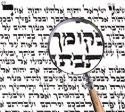
[ The following is related to our Torah reading for this week, parashat Eikev.... ]
08.24.16 (Av 20, 5776) "The whole commandment that I command you today you shall observe and do, so that you may live..." (Deut. 8:1). The Hebrew phrase kol ha'mitzvah (כָּל־הַמִּצְוָה), here translated as "the whole commandment," refers to the heart attitude, or the inner passion of the soul. Some have linked the word "commandment" (מִצְוָה) with the word "connection" (צוותא), suggesting that God's commandments are the means by which we cleave to Him, as is written: "this is the love of God (אַהֲבַת אֱלהִים), that we keep his commandments" (1 John 5:3). The commandments are "for life" (Lev. 18:5), which means they serve as the call of the Beloved to rise to something far greater... The "Whole Commandment" is to walk in God's love. As it is written, tamim yiyeh im Adonai Elohekha: "You shall be wholehearted with the LORD your God" (Deut. 18:13), and "Fear God and keep his commandments - כִּי־זֶה כָּל־הָאָדָם - for this is the whole man" (Eccl. 12:13).
The Kotzker once said, "The prohibition against making idols includes the prohibition against making idols out of the commandments. We should never imagine that the whole purpose of the Torah is its outer form, but rather the inward meaning." Indeed, sacrificial blood was placed over the tablets of the law (i.e., the blood sprinkled on the kapporet, or the "crown" of the Ark) that represented God's forgiveness and atonement for sin. The life is "in the blood," which represents God's passion, the deepest truth of Torah. And this is the message of the gospel itself, of course, since the blood of Yeshua passionately shed for our sake has opened up a new and everlasting way for us to be rightly related to God (Heb. 9:12).
Holding fast to God...

08.24.16 (Av 20, 5776) Faith perseveres in the way of life... "You who have clung to the LORD your God are all alive today" (Deut. 4:4). The Hebrew word devakut (דְּבָקוּת) means "cleaving" and refers to communion with God. This word comes from davak (דָּבַק), meaning to "cling" or "stick" (the Modern Hebrew word for "glue" is devek (דֶבֶק) which also comes from the same root). Devakut, then, implies being intimately connected with God in an earnest and passionate relationship.... The sages comment that we can cleave to God only one day at a time, since our future is conditioned upon this present day and its challenges. As Yeshua said: "Take therefore no thought for tomorrow: for tomorrow shall take thought for the things of itself. Sufficient for the day its own trouble" (Matt. 6:34). One day at a time. The LORD gives us daily bread (לֶחֶם חֻקֵּנוּ) so that we may persevere for this day; he feeds us with hunger to teach us to rely on alone him for true life (Deut. 8:3). "For he is our God, and we are the people of his pasture and the sheep of his hand today -- if you hear his voice" (Psalm 95:7). Today, if you hear his voice, do not harden your heart (Heb. 3:15). "Take care, brothers, lest there be in any of you an evil, unbelieving heart, leading you to fall away from the living God, but encourage one another every day, as long as it is called "today," so that none of you may be hardened by the deceitfulness of sin" (Heb. 3:12-13).
דָּבְקָה נַפְשִׁי אַחֲרֶיךָ
בִּי תָּמְכָה יְמִינֶךָ
da·ve·kah · naf·shi · a·cha·re·kha
bi · tam·khah · ye·mi·ne·kha

"My soul clings to you;
Your right hand upholds me."
(Psalm 63:8)
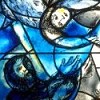
Hebrew Study Card
Gratitude and Seeing...
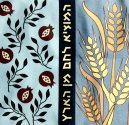
08.24.16 (Av 20, 5776) From our Torah this week (i.e., parashat Eikev) we read: "And you shall bless the LORD your God for the good..." (Deut. 8:10). Whenever we derive benefit or enjoyment from something we are to bless (i.e., thank) God for his goodness. Indeed the Hebrew term for gratitude is hakarat tovah (הַכָּרַת טוֹבָה), a phrase that means "recognizing the good." The heart looks through the eye, and therefore how we see is ultimately a spiritual decision: "If your eye is "single" (i.e., ἁπλοῦς, sincere, focused)," Yeshua said, "your whole body will be filled with light" (Matt. 6:22). When we see rightly, we are awakened to God's Presence in the little things of life, those small miracles and "signs and wonders" that constantly surround us. The good eye of faith sees hundreds of reasons to bless God for the precious gift of life (1 Cor. 10:31). Open your eyes... The LORD is "enthroned among the blessings of His people" (Psalm 22:3).
אַתָּה קָדוֹשׁ
יוֹשֵׁב תְּהִלּוֹת יִשְׂרָאֵל
ve·at·tah · ka·dosh · yo·shev · te·hil·lot · yis·ra·el

"You are holy,
enthroned on the praises of Israel."
(Psalm 22:3)

The thank offering mentioned in the Torah (i.e., zevach ha-todah: זֶבַח הַתּוֹדָד) reappears in the New Testament. In the Book of Hebrews were are instructed to "continually offer up a sacrifice of thanks (זֶבַח תּוֹדָה) to God, that is, the fruit of lips that acknowledge his Name" (Heb. 13:15). It is interesting to note that the Greek verb used to "offer up" (i.e., ἀναφέρω) is used to translate the Hebrew verb "to draw near" (karov) in Leviticus. In other words, the "offering up of thanks" for the sacrifice of Yeshua functions as "korban" and draws us near to God. Thanking God for personal deliverance constitutes "right sacrifices" (זִבְחֵי־צֶדֶק) as we draw near to God in the hope of His love (Psalm 4:5; Heb. 7:19).
"Give thanks to the LORD for He is good; his love endures forever" (Psalm 136:1); "give thanks to the LORD always" (Col. 3:17; Eph. 5:20; 1 Thess. 5:18)... Gratitude is foundational to our lives as followers of Yeshua. Indeed there are really only two prayers we ever offer to God, namely "Help, LORD!" and "Thank you, LORD." Meister Eckhart once remarked that if the only prayer you said in your entire life was, "thank you," that would suffice... Genuine prayer ultimately resolves to an expression of thanks. We are to "praise the Bridge that carries us over" into the Presence and Love of God, and that Bridge is Yeshua our Lord.
Close in all our Calling...

08.24.16 (Av 20, 5776) The Torah states that the LORD is close to us "in all our calling to Him" (Deut. 7:7). He listens to all of our heart's cry - our yearning, our lament, as well as our praise, and attends to our daily needs. Our part is to turn to God for help in all that we do: we are to "know Him in all our ways" (בְּכָל־דְּרָכֶיךָ דָעֵהוּ) by trusting in his nearness (Prov. 3:5-6). Even if we feel our prayer is unanswered, we trust despite our temporary darkness, believing that God sees our need and knows what is best for us. God is close "in all our calling to Him" (בְּכָּל־קָרְאֵנוּ אֵלָיו), and therefore we are often brought to a place of need. We can endure suffering and find acceptance as we call upon God for help in all that we do.
Here and Now...

[ The following is related to our Torah reading for this week, parashat Eikev.... ]
08.24.16 (Av 20, 5776) "And now, Israel, what does the LORD your God ask of you..?" (Deut. 10:12). This is the unending question for the heart of faith: it is always here and it is always "now." The midrash says that the word "and now" (וְעַתָּה) implies the "what" of repentance (תְּשׁוּבָה), that is, turning to God in this hour, regardless of whatever has happened in your past. True repentance turns you away from the darkness of fear to become present before the LORD (יהוה), who is the Source of light, life, love, and healing. "Come just as you are," but please, come...
Circumcision of the Heart...

[ The following is related to our Torah reading for this week, parashat Eikev.... ]
08.23.16 (Av 19, 5776) Our Torah for this week (i.e., parashat Eikev) appeals to our need to forgive: "Circumcise therefore the foreskin of your heart, and be no longer hardened" (Deut. 10:16). The metaphor of a "circumcised heart" (ברית מילה של הלב) symbolizes cutting away the outer covering of the heart so that it is "opened up" to feel once again. God wants us to let go of "hard feelings" so we can experience compassion (i.e., com+passion: "feeling-with") and sympathy for other people... Heart circumcision represents a radical turning away from the insular realm of the self toward the emotional realm of others and God. When our hearts are open, we are able to receive the flow of the Spirit of God and obey the "law of the Messiah" (תּוֹרַת הַמָּשִׁיחַ) to bear one another's burdens (Gal. 6:2).
וּמַלְתֶּם אֵת עָרְלַת לְבַבְכֶם
וְעָרְפְּכֶם לא תַקְשׁוּ עוֹדָ
u·mal·tem · et · or·lat · le·vav·khem
ve·or·pe·khem · lo · tak·shu · od

"Circumcise the foreskin of your heart,
and be no longer hardened"
(Deut. 10:16)

Physical circumcision represents a sign or mark of inclusion; it is a token that you are one of God's family, a Jew, though it is only a sign or token. Spiritual circumcision is an inner operation of the heart that marks you a true child of heaven. It is about your identity and purpose. Therefore we see the paradox that some physical Jews are not spiritual Jews, and some spiritual Jews are not physical Jews (though some are both), as the Apostle Paul said: For no one is a Jew who is merely one outwardly, nor is circumcision outward and physical. But a Jew is one inwardly, and circumcision is a matter of the heart, by the Spirit, not by the letter. His praise is not from man but from God (Rom. 2:28-29).
Spiritually speaking, a heart that is insensitive, indifferent, unfeeling, and callous toward the needs of others is regarded as "hard." Sometimes such hardness comes as a result of living in a fallen world. Many wounded people live with "scar tissue" that surrounds their heart, making them feel numb and unwilling to open up and trust others. Their affections have become disordered and their ego rationalizes blaming others or seeking various forms of entitlement. "Turning off your heart" can mean suppressing any positive regard for others (empathy) while nurturing anger and self-righteousness, or it may mean withdrawing from others as a lifeless shell (both approaches vainly attempt to defend the heart from hurt). Although Yeshua always showed great compassion, especially to the wounded and broken in spirit (Isa. 42:3), He regularly condemned the "hardness of heart" ("sclero-cardia," σκληροκαρδία) of those who opposed his message of healing and love.
A hard heart is closed off and impermeable to love from others, and especially from God. It is a "difficult" (קָשֶׁה) heart, inflexible and even cruel. Scripture uses various images to picture this condition, including a "heart of stone" (Ezek. 36:26, Zech. 7:12), an "uncircumcised heart" (Jer. 9:26), a "stiff neck" (Deut. 31:27), and so on. Stubbornness is really a form of idolatry, an exaltation of self-will that refuses to surrender to God. If you are wounded and afraid to open your heart in trust to others, ask God for healing...
Hardness of heart is something all of us deal with, even those who trust in Yeshua. After all, New Covenant believers are commanded to "put off the old self with its practices" (Col. 3:9) and are urged not to harden their hearts (μὴ σκληρύνητε τὰς καρδίας) through unbelief (Heb. 3:8,15, 4:7). May God's love help us keep our hearts soft and open toward others... May He give us a new heart, and put a new spirit within us. May He remove the heart of stone (לֵב הָאֶבֶן) from us and give us a heart of flesh (לֵב בָּשָׂר). May we be lev echad - "one heart" - with one another and with the Father (Ezek. 11:19). May we be so sensitized to the Presence of God that we detect the slightest touch from His hand upon us. Amen.
Personal Update: Please remember me in your prayers, friends.. My health is a concern and we pray daily for God's strength to keep us going. Thank you so much... - john
The Fear of the LORD...
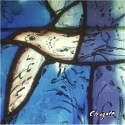
[ The following concerns this week's Torah reading, parashat Eikev.... ]
08.23.16 (Av 19, 5776) Some people are afraid that God will punish them for their sins, but the true fear of God, yirat shamayim (יִרְאָת שָׁמַיִם), is the tragedy of losing our closeness to Him... This is the fear of the Lord. The sages say that where it is written, "What does the LORD ask of you except to fear the LORD" (Deut. 10:12), we should read instead, "fear with the LORD" (לְיִרְאָה אֶת־יְהוָה), that is, we share his concern that we could forfeit the sanctity of a heart-relationship with Him due to carelessness and sin... We fear our sin because it blinds us from awareness of God's care and love. The fear of God can therefore be understood as God's fear that we will miss the blessing of intimately knowing him.
The LORD has promised to never leave nor forsake us, though we can choose to turn away from his love and care for our lives... We are not permitted to fear other than that we have no fear of God, for that indeed is a fearful state of soul. May it please God to help each us never to leave nor forsake ourselves by getting lost, by forgetting what is real, and by abandoning hope in the miracle for our lives... May the LORD help us not be grieved, not to hurt ourselves, and never to abandon our hearts to the despair of shame...
Note that the fear of the LORD, or "yirat Adonai" (יִרְאַת יְהוָה), is not the fear of punishment but rather the awe of God's love and intimate concern for your life... It is "techillat chokhah" (תְּחִלַּת חָכְמָה), "the start of wisdom," imparting awareness of the sacred gift of your life, your destiny, and your true end before heaven... If there is a negative aspect to the "fear of the LORD," it may be regarded as the fear of damage to your heart and soul – that is, the fear that sin will blind you to God's passion for you...
תְּחִלַּת חָכְמָה יִרְאַת יְהוָה
וְדַעַת קְדשִׁים בִּינָה
te·chil·lat · chokh·mah · yir·at · HaShem
ve·da·at · ke·do·shim · bi·nah

"The fear of the LORD is the start of wisdom,
and the knowledge of the Holy One is insight."
(Prov. 9:10)
Some may object that all people (including unbelievers) should fear God (i.e., because God might send them to hell), but that appeal only makes sense if we assume the person has some sort of faith - no matter how indistinct or rudimentary... But a guilty conscience does not mean spiritual rebirth, though it may be a step on the way... The doctrine of the wrath of God is an important thing to consider, to be sure, and it is profoundly connected with his holiness and righteous judgment regarding sin, but it is essentially eschatological, a reciprocal response of heaven that ratifies the individual's willing rejection of God's salvation given in Yeshua, the one who mediates God's truth and his mercy (see Psalm 85:10). For the believer in the One who loves us so much he became the "Son of Man" to die as our substitutionary sacrifice, however, the fear of God is better expressed as reverent awe over his compassion: "That Messiah may dwell in your hearts through faith -- that you, being rooted and grounded in love, may have strength to comprehend with all the saints what is the breadth and length and height and depth, and to know the love of Messiah that surpasses knowledge, that you may be filled with all the fullness of God" (Eph. 3:17-19).
Seeing the Sacred...

08.23.16 (Av 19, 5776) From our Torah portion this week (i.e., parashat Eikev) we read: "And now, Israel, what does the LORD your God require of you, but to fear the LORD your God..." (Deut. 10:12). Every moment of life is an opportunity to ask the question: "How may I see the sacred here?" How may I revere and esteem the gift of life? How may I perceive the awe of God? Seize the moment and walk in God's way, today, now, and in this hour. Open your heart; renew your mind; turn to the light; find the sacred in your midst...
הוֹרֵנִי יְהוָה דַּרְכֶּךָ
אֲהַלֵּךְ בַּאֲמִתֶּךָ
יַחֵד לְבָבִי לְיִרְאָה שְׁמֶךָ
ho·rei·ni · Adonai · dar·ke·kha
a·hal·lekh · ba·a·mi·te·kha
ya·ched · le·va·vi · le·yir·ah · she·me·kha

"Teach me your way, O LORD,
that I may walk in your truth;
unite my heart to fear your Name"
(Psalm 86:11)
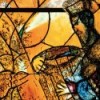
King David understood the great need for focus, for passion, for surrender: "One thing I ask of the Lord; that is what I will seek" (Psalm 27:4). Therefore he prayed for deep healing: "Teach me your way, O LORD, and I will walk in your truth; unite my heart to fear your Name" (Psalm 86:11). David understood that walking in the truth required "uniting his heart," or "repairing the breach" within his inner affections so that he could experience God's Presence... He needed emotional healing from inner wounds that split him off from reality. In effect, David prayed: "After You have healed my ambivalent heart, I will thank You with all my heart - entirely, wholly, completely - and I will glorify Your Name forever. My healing comes from Your great love (chesed) toward me, and through your love I am delivered free from the depths of hell" (Psalm 86:12-13).
Where it says, "Ve'ahavta et Adonai be'khol levavkha" – you shall love the LORD your God with all your heart" (Deut. 6:5) that includes both your "good heart" and your "bad heart" – that is, all of you, all of your being, the whole person. Come as you are - broken, fragmented, divided within - and ask God to unify your heart by the miracle of his grace...
"The greatest thing each person can do is to give himself to God utterly and unconditionally - weaknesses, fears, and all. For God loves obedience more than good intentions or second-best offerings, which are all too often made under the guise of weakness." - Soren Kierkegaard
Believing in Love...

08.22.16 (Av 18, 5776) From our Torah portion for this week (i.e., parashat Eikev) we read: "But now, Israel, what does the LORD your God ask from you ... but to love him with all your heart and with all your soul?" (Deut. 10:12). But how are we able to love God be'khol levavka (בְּכָל־לְבָבְךָ) – "with all our heart" – and be'khol nafshekha (וּבְכָל־נַפְשֶׁךָ) - "with all our soul," apart from healing of the brokenness that makes our hearts divided and sick? That is what the redemption from Egypt was about: we were personally chosen by God, redeemed by his grace, led out from from cruel bondage, only to be led into the desert, away from the world, where we slowly began to understand that we were valued, cared for, and beloved of God. We believed in the possibility of promise, of covenant... Only then could we hear the request from heaven: "Now love Me..." In other words, we can only truly love God by knowing we are beloved by God, and the invitation to love him is a response of his great passion for you (1 John 4:19). Accept that you are accepted in the heart of the Beloved (Eph. 1:4-6).
וְעַתָּה יִשְׂרָאֵל מָה יְהוָה אֱלהֶיךָ שׁאֵל מֵעִמָּך
כִּי אִם־לְיִרְאָה אֶת־יְהוָה אֱלהֶיךָ לָלֶכֶת
בְּכָל־דְּרָכָיו וּלְאַהֲבָה אתוֹ וְלַעֲבד אֶת־יְהוָה אֱלהֶיךָ
בְּכָל־לְבָבְךָ וּבְכָל־נַפְשֶׁךָ
ve·at·tah Yisrael, mah Adonai E·lo·hey·kha sho·el me·im·makh
ki im le·yir·ah et Adonai E·lo·hey·kha la·le·chet
be·khol de·ra·khav ul·a·ha·vah o·to, ve·la·a·vod et Adonai
E·lo·hey·kha be·khol le·vav·kha uv·khol naf·she·ka?

"And now, Israel, what does the LORD your God require of you,
but to fear the LORD your God, to walk in all his ways, to love him,
to serve the LORD your God with all your heart and with all your soul?
(Deut. 10:12)

What God asks from us is simply the impossible, since the human heart is unable to truly love and serve the LORD apart from grace (Mark 7:21-23; Matt: 15:19-20). The real miracle of faith is found in a transformed heart (Eph. 2:1-10). It is never a question of "willpower" or the "zeal" of man; no - it is never a question of what I can do but rather what God can do (John 1:13). It is the strength of His grip that holds you, not the strength of your own...
Shabbat Va'tomer Tzion...
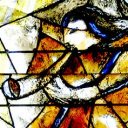
08.21.16 (Av 17, 5776) The weekly haftarah portion (i.e., reading from the Prophets) is usually thematically connected with the weekly Torah portion; however, after the fast of Tishah B'Av, and for the next seven weeks (49 days) leading up Rosh Hashanah (i.e., the new year), we will read selections of comfort that foretell of the future redemption of the Jewish people and the coming Messianic Era. In other words, we have a seven-week period of consolation, encouraging us to keep our hope alive, culminating in the "jubilee" of the Jewish new year. May God prepare our hears, chaverim....
Seven Weeks of Comfort:
- Nachamu, Nachamu Ammi ("Comfort, comfort, my people") - Isa. 40:1-26
- Va'tomer Tziyon ("But Zion said...") - Isa. 49:14-51:3 (this week)
- Aniyah So'arah ("O afflicted and storm-tossed") - Isa. 54:11–55:5
- Anochi, Anochi hu ("I, even I am He...") - Isa. 51:12–52:12
- Rani Akarah ("Sing, O Barren one...") - Isa. 54:1–10
- Kumi Ori ("Arise and shine..." - Isa. 60:1–22
- Sos Asis ("I will greatly rejoice...") - Isa. 61:10–63:9
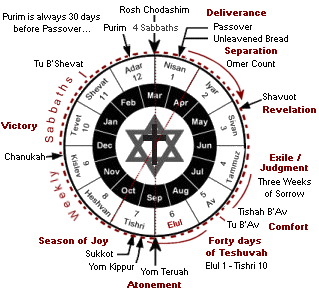 |
The second of the "Seven Weeks of Comfort" leading up to Rosh Hashanah is called Va'tomer Tzioyn (וַתּאמֶר צִיּוֹן, "But Tzion said..."), which reminds us to never to lose hope for the heavenly future of Zion (Jerusalem).... "Can a woman forget her nursing child, that she should have no compassion on the son of her womb? Even these may forget, yet I will not forget you. Behold, I have engraved you on the palms of my hands; your walls are continually before me" (Isa. 49:15-16). The Haftarah concludes by Isaiah saying that the LORD will comfort the Mountain of Zion by making it like the Garden of Eden, with joy and happiness within her, along with thanksgiving and the sound of song.
Note: The month of Elul (חודש אלול) begins in just two of weeks (i.e., Friday, September 2nd this year), which initiates the 40 day period of preparation for the Jewish High Holidays (ימים נוראים). This means that Rosh Hashanah (ראש השנה) will begin in about six weeks (i.e., October 2nd sundown). During the time leading up to the High Holidays, we engage in cheshbon ha-nefesh (חשבון נפש, "soul searching") and derive comfort by affirming that God is forgiving and loving to those who sincerely turn to Him. For more information about the "Forty Days of Teshuvah" beginning the month of Elul pages.
Parashat Eikev - עקב
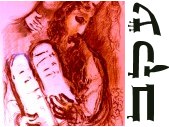
[ The Torah reading for this week is parashat Eikev, traditionally read during Shabbat Va'tomer, the second "Sabbath of Consolation" after Tishah B'Av. ]
08.21.16 (Av 17, 5776) In our Torah reading for this week (i.e., parashat Eikev), Moses continues his farewell address to Israel by saying, "And because (עֵקֶב) you listen to these rules and keep and do them, the LORD your God will keep with you the covenant and the love that he swore to your fathers" (Deut. 7:12). Note that the word eikev (עֵקֶב), often translated "because," literally means "heel," which recalls Jacob (יעקב) the "heel-holder" who wrestled with the pain of his past to learn to bear the name Israel (יִשְׂרָאֵל), the "prince of God" (Gen. 32:28)... And like Jacob, we must grapple to believe that the covenant of God's love and acceptance is for us, too... The Sassover rebbe interpreted the opening verse of our Torah portion, "And because you will listen..." (וְהָיָה עֵקֶב תִּשְׁמְעוּן) as, "and it shall be when your heel is ready to take a step, you will listen to your heart." This is the step of faith. As you begin to walk with God, you will come to know yourself as a child of the great King. Likewise regarding the related verse in the Torah, "Because Abraham heard my voice" (עֵקֶב אֲשֶׁר־שָׁמַע אַבְרָהָם בְּקלִי), the sages read, "Abraham heard the word 'down to his heel'" (Gen. 26:5). Like Abraham, we will hear God's voice as we walk with him by faith...
עֵץ־חַיִּים הִיא לַמַּחֲזִיקִים בָּהּ
וְתמְכֶיהָ מְאֻשָּׁר
etz · cha·yim · hi · la·ma·cha·zi·kim · bah
ve·to·me·khe·ha · me·u·shar

"Torah is a tree of life to those who lay hold of it;
and those who hold it fast are called blessed"
(Prov. 3:18)

Hebrew Study Card
Note: For more on this important Torah portion, see the parashah summary page. You can also download the Shabbat Table Talk for Eikev here:
The Central Fact of Life...

08.19.16 (Av 15, 5776) The most important fact of all history - and that which radically transforms everything else - is the resurrection of Yeshua from the dead (תחייתו של משיח). Spiritual life means being awake to the risen reality and saving Presence of Yeshua, the One who Overcame and vanquished the power of death. Without Him we are hopeless; with Him we are more than conquerors (1 Cor. 15:14; Rom. 8:37). The resurrection means Yeshua is forever alive, and that today he hears your heart's cry. He is surely able to help you, and nothing can overthrow his invincible will. Our Lord suffered and died for your inner peace and healing, but now death has no hold over him, and he "ever lives to make intercession for you" (Rom. 6:9, Heb. 7:25). He is your compassionate Advocate (παράκλητος, lit. "one called alongside") who gives you heavenly comfort (1 John 2:1). Even more: The very power that raised Yeshua from the dead now dwells in you (Rom. 8:11). The miracle of new life is "Messiah in you - the hope of glory" (Col. 1:27). The Lord will never leave you nor forsake you (Heb 13:5): He "sticks closer than a brother" (Prov. 18:24); He sustains your way, and he will perfect the work of salvation on your behalf (Jude 1:24). In short, there simply is no "gospel" message apart from the resurrection! The resurrection is the victory of God's plan of salvation - His everlasting vindication over the powers of darkness - for your life.
Personal Update: I want to thank those of you who have prayed for my health... I have been feeling better lately, and I've been able to write and pray without terrible pain or distraction. Thank you so much for caring enough to pray; my family deeply appreciates it!
Strangers to this World...

08.19.16 (Av 15, 5776) God's children are always "strangers" in this world; they are literally "e-stranged" -- living here, yet not here. We are outsiders and pilgrims, not at home in this world, and our faith therefore is both a type of "protest" against any interpretation of reality that excludes, suppresses, denies, or minimizes the Divine Presence as well as a longing for the place where we truly belong.... If you feel crazy in an insane situation, then you are really quite sane... The world will feel oppressive and strange once you have been awakened from its madness and refuse to be moved by the delusions of the crowd... Life in olam hazeh (this world) is a place of passing that leads to the world to come. Our faith affirms that underlying the surface appearance of life is a deeper reality that is ultimately real and abiding. It "sees what is invisible" (2 Cor. 4:18) and understands (i.e., accepts) that the "present form of this world is passing away" (1 Cor. 7:31).
כִּי־גֵרִים אֲנַחְנוּ לְפָנֶיךָ
וְתוֹשָׁבִים כְּכָל־אֲבתֵינוּ
כַּצֵּל יָמֵינוּ עַל־הָאָרֶץ וְאֵין מִקְוֶה
ki ge·rim a·nach·nu le·fa·ne·kha,
ve·to·sha·vim ke·khol a·vo·tei·nu,
katz·tzel ya·mei·nu al ha·a·retz · ve·ein mik·veh

"For we are strangers before you
and sojourners, as all our fathers were.
As a shadow are our days on the earth, and there is nothing that abides"
(1 Chron. 29:15)

The Apostle Paul taught that we to be "conformed" (σύμμορφος) to the Messiah (Rom. 8:29), but not "conformed" (συσχηματίζω) to the pattern of this fallen world (Rom. 12:2). The former word means to resemble or be made similar in purpose or form (μορφή), whereas the latter means to accept the world's scheme (σχῆμα) of understanding things, to passively go along with the world's lies, wishful thinking, fearmongering, propaganda, etc. Of course we need God's help to escape the "programming" of our age, and therefore the Holy Spirit helps us to become transfigured – "changed from the inside out" - by the renewal of our minds, enabling us to see things in light of the reality of our identity in the Messiah. So refuse to let the world system get you down, but focus on God and His glory. Take heart, friends: being exiled by the world is an indication that you belong to the Kingdom of God...
Who is your neighbor?

08.19.16 (Av 15, 5776) Our Torah for this week (i.e., parashat Vaetchanan) repeats Aseret Hadibrot (the Ten Commandments) as they were initially given in Parashat Yitro (Ex. 20:2-17). Though there are some slight language differences between the Exodus and Deuteronomy versions, both begin with "I AM" (אָנכִי) and both end with "[for] your neighbor" (לְרֵעֶךָ). Joining these together says "I am your neighbor," indicating that the LORD Himself is found in your neighbor. When we love our neighbor as ourselves (אָהַבְתָּ לְרֵעֲךָ כָּמוֹךָ), we are in effect showing love for the LORD. We must learn to disregard the claims of our ego and cling to the idea of chesed. So who is your neighbor? You are -- to every other soul you may encounter this day...
Dangers of Idolatry...

08.19.16 (Av 15, 5776) "Take care, lest you forget the covenant of the LORD your God, which he made with you, and you make a carved image, the form of anything that the LORD your God has forbidden you" (Deut. 4:23). A graven image (פֶּסֶל) is an idol that serves as a counterfeit to the real; it is a rationalization, a compromise, and an imitation of the truth (and therefore it is the embodiment of untruth). There is "living truth" in its originality, expressed in simplicity of heart that draws near to God in faith, and there is "religion" with its rituals, its copies of the original moment, its enshrined ideals that cannot move, breath, or act in this world for righteousness. The idol – whether it is religious, doctrinal, aesthetic, athletic, or simply the vain worship of popular culture – serves as a sham of the real, and therefore it is an evasion designed to insulate people from dealing with the truth...
The Central Fire...
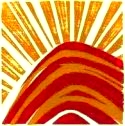
08.19.16 (Av 15, 5776) At the revelation at Sinai, "the mountain burned with fire to the heart of heaven" (בָּאֵשׁ עַד־לֵב הַשָּׁמַיִם), wrapped in darkness, cloud, and heavy mist" (Deut. 4:11). Yet what is this divine Fire if it is not the very passion of God - a passion that descends from the "heart of heaven" to the place of revelation within the human heart? Indeed the fire is none other than the Word of God, "the Voice that speaks from the midst of the fire" (קוֹל אֱלהִים מְדַבֵּר מִתּוֹךְ־הָאֵשׁ) the truth revelation (see Exod. 3:2, Deut. 4:33). As the Spirit asks: "Who has ascended to heaven and come down? Who has gathered the wind in his fists? Who has wrapped up the waters in a garment? Who has established all the ends of the earth? What is his name, and what is his Son's name? Surely you know" (Prov. 30:4).
מִי עָלָה־שָׁמַיִם וַיֵּרַד
מִי אָסַף־רוּחַ בְּחָפְנָיו
מִי צָרַר־מַיִם בַּשִּׂמְלָה
מִי הֵקִים כָּל־אַפְסֵי־אָרֶץ
מַה־שְּׁמוֹ וּמַה־שֶּׁם־בְּנוֹ כִּי תֵדָע
mee a·lah–sha·ma'·yeem vai·ye·rad?
mee a·saf–roo'·ach be·chof·nav?
mee tza·rar–ma'·yeem ba·seem·lah?
mee che·keem kol–af·sei–a'·retz?
mah–she·mo oo·mah–shem–be·no - kee tei·da!

"Who has ascended to heaven and come down? Who has gathered the wind in his fists? Who has wrapped up the waters in a garment? Who has established all the ends of the earth? What is his name, and what is his son's name? Surely you know!"
(Prov. 30:4)

Hebrew Study Card
Yeshua is the Center of Creation - its beginning and end. As it is written: אָנכִי אָלֶף וְתָו רִאשׁוֹן וְאַחֲרוֹן ראשׁ וָסוֹף / "I am the 'Aleph' and the 'Tav,' the First and the Last, the Beginning and the End" (Rev. 22:13). "For from him and through him and to him are all things. To him be glory forever. Amen" (Rom. 11:36). Indeed he is called מֶלֶךְ מַלְכֵי הַמְּלָכִים / Melech Malchei Hamelachim: The "King of kings of kings" and the LORD of all possible worlds -- from the highest celestial glory to the dust of death upon a cross. Yehi shem Adonai mevorakh (יְהִי שֵׁם יהוה מְברָךְ): "Let the Name of the LORD be blessed" forever and ever (Psalm 113:2).
In Hebrew, the "heart" of something represents its core. center, and essence. Revelation is a matter of the heart, written by the God's Spirit, yielding a life of praise and thanks to the Lord.
Keep your soul diligently...

[ The following concerns this week's Torah reading, parashat Vaetchanan, which is always read on the Sabbath following Tishah B'Av... "Comfort ye My people...." ]
08.19.16 (Av 15, 5776) From our Torah portion this week we read: "you who did cleave to the LORD your God are all alive today... Only take heed to yourself (רַק הִשָּׁמֶר לְךָ) and keep your soul very diligently (וּשְׁמר נַפְשְׁךָ מְאד), lest you forget ..." (Deut. 4:4,9). This warning underscores the danger we face of "forgetting" God, of losing sight of the truth of reality, and thereby lapsing into the realm of the profane.... We must, therefore, foster within us a state of constant devotion (devakut) that encounters the greatness of God in the midst of our daily lives. "Give us this day our daily bread." Your life, your being, and your very existence come from God, forgetting this leads to the "tohu vavahu" of the unreal....
The Father of Lights...

08.19.16 (Av 15, 5776) It is written in our Scriptures: "God is light and in him is no darkness at all" (1 John 1:5). Our Savior is "the Light of the world," the overarching Reality that gives light to every soul who is born (John 1:9). As the Source of all light, his power is irrepressible, invincible, and overcomes every shade of darkness. Yeshua is the Logos (Λόγος), the underlying "logic" of all of creation. Unlike the transient radiance of the heavenly bodies, the Divine Light remains constant and supreme over all of creation, without any diminution or variation: God is the "Father of Lights" (James 1:17). And just as we know that the sun still shines even on the most overcast of days, so we understand that the Divine Presence is always there -- always giving, always shining, always loving us... We can trust in the power of our God to help us, since His radiance and truth pervade the darkness to enlighten our way (Psalm 112:4). As Yeshua said of his mission, "I have come into the world as light, so that whoever believes in me may not remain in darkness" (John 12:46). O precious LORD our God, let your light shine upon us...
אֱלהִים יְחָנֵּנוּ וִיבָרְכֵנוּ
יָאֵר פָּנָיו אִתָּנוּ סֶלָה
E·lo·him · ye·chon·nei·nu · vi·var·khei·nu
ya·er · pa·nav · it·ta·nu · se·lah

"May God be gracious to us and bless us
and make his face to shine upon us, selah."
(Psalm 67:1)

Allow the light of God's love to shine in you brightly. As Yeshua our Savior said, "Whoever has my commandments and keeps them, such is the one who loves me. And the one who loves me will be loved by my Father, and I will love him and will manifest myself to him" (John 14:21). Note that the Greek word for "manifest" means to "shine inside" (i.e., ἐμφανίζω, from ἐν, "in" and φαίνω, "shine"), indicating that the revelation would be inward light of the Divine Presence. Indeed, the Hebrew word for "praise" (i.e., tehillah: תְּהִלָּה) comes from a verb that means "to shine" (i.e., halal: הָלַל), from which we derive the word "halo." Similarly, the word "aura" comes from the Hebrew word "ohr" (אוֹר), meaning "light." Let your inner light shine before others so that they may see your good works and give honor to your Father who is in heaven" (Matt. 5:16).
Faith of the Heart...

08.18.16 (Av 14, 5776) Those who refuse the truth of God are described as those who "walk in the futility (ματαιότης) of their minds" (Eph. 4:17). "They are darkened in their understanding, alienated from the life of God because of the ignorance (i.e., ἄγνοια - "agnosticism") that is in them, due to their hardness of heart" (Eph. 4:18). This hardness of heart (σκληροκαρδία) leads to a cynical state of callousness or apathy (ἀπαλγέω, lit. "numbness," the "inability to feel"), which is the very opposite of empathy or compassion (Eph. 4:19). Notice the progression of this process. People close their eyes to the light and become estranged from the life of God because they choose to have a hard heart (לב קשה). Put the other way around, hardening the heart leads to willed ignorance, alienation from the life of God, darkened understanding, and a "futile" mind... But notice that the heart of man is central because it determines the "contours of life" (Prov. 4:23). It is the heart (לֵבָב), or the "inner man," that that focuses the will to believe, determining what we acknowledge and what we ignore. Indeed, salvation itself is a matter of turning to see (teshuvah) and believing from the heart (πιστεύσῃς ἐν τῇ καρδίᾳ σου) the Reality of God's great love and healing given to us in Yeshua (Rom. 10:9).
The Unity of Love...
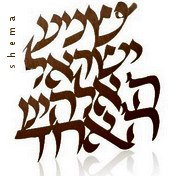
[ The following concerns this week's Torah reading, parashat Vaetchanan, which is always read on the Sabbath following Tishah B'Av... "Comfort ye My people...." ]
08.18.16 (Av 14, 5776) Our Torah for this week includes the first part of the Shema (שמע): "Hear, O Israel, the LORD is our God; the LORD is One, and you shall love (וְאָהַבְתָּ) the LORD your God with all your heart and with all your soul and with all your might" (Deut. 6:4-5). During its recitation we pronounce each word very carefully and cover our eyes with our right hand, focusing on the sovereignty of God and our primary need to love Him with our whole being. Yeshua said that the Shema was the great commandment of Torah (see Mark 12:28-31). Note that the opening declaration of the Shema includes three Divine Names: Lord (יהוה), God (אלהים), and Lord (יהוה) again, which suggests the multiplicity-in-oneness (unity) that the word "echad" implies (see below). The two letters Ayin (ע) and Dalet (ד) are written enlarged in the opening verse of the Shema. Together, these letters form the word 'ed (עֵד), which means "witness," suggesting that we recite the Shema to testify of the sovereignty of God and our great need to love Him bekhol levavkha, (בּכָל־לְבָבְךָ) with all our hearts...
שְׁמַע יִשְׂרָאֵל יְהוָה אֱלהֵינוּ יְהוָה אֶחָד
she·ma · Yis·ra·el · Adonai · E·lo·hei·nu · Adonai · e·chad

"Hear, O Israel, the LORD our God is one LORD."
(Deut. 6:4)

Hebrew Study Card / Shema Reader Page
The Shema says "The LORD our God is one LORD" (יְהוָה אֱלהֵינוּ יְהוָה אֶחָד). Interestingly, the word echad (אֶחָד) in Hebrew, translated as "one," implies unity in diversity, not absolute numerical identity (the word for one and only one, i.e., "unique," is yachid (יָחִיד)). For example, in Exodus 26:6 the parts of the Tabernacle (Mishkan) are to be constructed so that "it shall be one (echad) tabernacle," and Ezekiel spoke of two "sticks" (representing fragmented Israel) as being reunited into one: "and they shall be one (echad) stick in My hand" (Ezek. 37:19). Moses also uses echad in Genesis 2:24 when he says: "And they (husband and wife) will become one flesh (basar echad)." God's attributes as Compassionate Source of life, Eternal Judge, and Savior, are unified and affirmed in this verse. Ultimate Reality is multidimensional, personal and loving, and that is part of the very essence of God. There is no such thing as a "Person" - either human or Divine - that exists in an absolute vacuum, outside of relationship. Absolute monism is inconsistent with the idea of Divine Personhood, just as Aristotle's "Unmoved Mover" is a logical absurdity.
Note: For more information about the Shema and its blessings, or to download Shema study pages, please see the Shema section of the site. Shalom.
Return to your Heart...
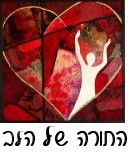
08.18.16 (Av 14, 5776) In our Torah portion for this week we read, "Know therefore today and return to your heart (וַהֲשֵׁבתָ אֶל־לְבָבֶךָ), for the LORD is God in heaven above and on the earth beneath; there is no other" (Deut. 4:39). Here again we see the centrality of the heart as the mode to encounter God (Luke 17:21). Savor the phrase, "Know therefore today and return to your heart..." It the heart that is the place of connection with God... As Yeshua said, "Behold, I stand at the door and knock. If anyone hears my voice and opens the door, I will come in to him and eat with him, and he with me" (Rev. 3:20). Today is the day to "return to your heart" and receive again God's love for your soul...
וְיָדַעְתָּ הַיּוֹם וַהֲשֵׁבתָ אֶל־לְבָבֶךָ
כִּי יְהוָה הוּא הָאֱלהִים בַּשָּׁמַיִם מִמַּעַל
וְעַל־הָאָרֶץ מִתָּחַת אֵין עוֹד
ve·ya·da·ta · ha·yom · va·ha·she·vo·tai · el · le·va·ve·kha
ki · Adonai · hu · ha·E·lo·him · ba·sha·ma·yim · mi·ma·al
ve·al · ha·a·retz · mi·ta·chat · ein ·od

"Know therefore today, and lay it to your heart,
that the LORD is God in heaven above and on the earth beneath;
there is no other." - Deut. 4:39

My LORD my Yeshua...

08.17.16 (Av 13, 5776) As we draw close to God and learn how to cleave to his heart, we will be delivered from the pain of our fears, despite the ongoing darkness of ha'olam ha'zeh (הָעוֹלָם הַזֶּה), this present age (Psalm 119:105). As King David said, Adonai ori v'yishi, mimi ira: "The LORD is my light and my salvation" – literally, "my Jesus," my Yeshua – "whom shall I fear? Adonai ma'oz chayai, mimi efchad: "The LORD is the refuge of my life, of whom shall I be afraid?" (Psalm 27:1). Yeshua is the Light of Life (אוֹר הַחַיִּים), the Healer of the fearful heart, the I-AM-WITH-YOU-ALWAYS One. His love overcomes all our fears. As the apostle Paul asked, "If God is for us, who can be against us?" (Rom. 8:31).
יְהוָה אוֹרִי וְיִשְׁעִי מִמִּי אִירָא
יְהוָה מָעוֹז־חַיַּי מִמִּי אֶפְחָ
Adonai o·ri ve·yish·i, mi·mi i·ra
Adonai ma·oz chai·yai, mi·mi ef·chad

"The LORD is my light and my salvation; whom shall I fear?
The LORD is the stronghold of my life; of whom shall I be afraid?"
(Psalm 27:1)

Hebrew Study Card
The "footsteps of the Messiah" are approaching, friends; let us then heed the words of our Savior: "when you see these things taking place, you know that the time is near, right at the door" (Mark 13:29), and let us encourage one another to wake up and come alive: "Awake, O sleeper, and arise from the dead, and Messiah will shine on you!" (Eph. 5:14). The message of teshuvah (repentance, "turning back to God") is always, "Wake up - you are living a nightmare." There is only one remedy, and that is discovered by coming to the Divine Light by opening your heart to the love and very real presence of God.
Finding God in Exile...

08.17.16 (Av 13, 5776) From this week's Torah (i.e., parashat Va'etchanan) we read: "if you seek for the LORD your God from there, you will find him, if you search for him with all your heart (בְּכָל־לְבָבְךָ) and with all your soul" (Deut. 4:29). From where do we search, from what place, except while we are in exile, after hardship, testing, and tribulation? If you seek for the LORD your God from there - in the midst of your exile, in the midst of your heart's cry - you will find him there, in your heart. This message is a prophecy, so that even after testing befalls you, in the end you will belong to the LORD and will hear his voice.
וּבִקַּשְׁתֶּם מִשָּׁם אֶת־יְהוָה אֱלהֶיךָ וּמָצָאתָ
כִּי תִדְרְשֶׁנּוּ בְּכָל־לְבָבְךָ וּבְכָל־נַפְשֶׁךָ
u·vik·kash·tem · mi·sham · et · Adonai · E·lo·hey·kha · u·ma·tza·ta
ki · tid·re·she·nu · be·khol · le·va·ve·kha · u·ve·khol · naf·she·kha

"But you will seek the LORD your God from there and you will find Him,
if you search for Him with all your heart and with all your soul."
(Deut. 4:29)

Note that the word "you will seek" is in the plural, whereas the rest of the verse is in the singular. "Where is God to be found?" asks the Kotzker Rebbe, but "in the place where He is given entry!" As the Apostle Paul wrote, "The word is near you, in your mouth and in your heart" (that is, the word of faith that we proclaim); because, if you confess with your mouth that Yeshua is LORD and believe in your heart that God raised him from the dead, you will be saved. For with the heart one believes and is justified, and with the mouth one confesses and is saved. For the Scripture says, "Everyone who believes in Him will not be put to shame." For there is no distinction between Jew and Greek; for the same LORD is LORD of all, bestowing his riches on all who call on him. For "everyone who calls on the name of the LORD will be saved" (Rom. 10:8-13).
Keeping Faith in Prayer...

08.16.16 (Av 12, 5776) If you pray but are tempted to think that God is not responding, remind yourself that every prayer uttered to God from a heart of honest faith, that is, from a heart that trusts in God's redemptive love given in Messiah, is indeed answered, and not a syllable goes unheeded or will be lost before heaven. Just as assuredly we believe that no one will get away with evil -- that justice will eventually be served and all wrongs redressed at the bar of Eternal Judgment -- so we understand that every utterance of the heart of faith finds compassionate response from the heart of heaven. Indeed the essence of teshuvah (return, "repentance") is heartfelt prayer, and therefore when we bring honest words and turn back to accept the truth, God's mercy and compassion are decisively evoked (1 John 1:9). The most important thing is not to lose faith, however, but to believe that God hears you and will indeed answer the cry of your heart. Never give up hope. God is faithful; He will do it (1 Thess. 5:22).
שׁוּבָה יִשְׂרָאֵל עַד יְהוָה אֱלהֶיךָ כִּי כָשַׁלְתָּ בַּעֲוֹנֶךָ
קְחוּ עִמָּכֶם דְּבָרִים וְשׁוּבוּ אֶל־יְהוָה
אִמְרוּ אֵלָיו כָּל־תִּשָּׂא עָוֹן וְקַח־טוֹב
וּנְשַׁלְּמָה פָרִים שְׂפָתֵינוּ
shu·vah · Yisrael · ad · Adonai · E·lo·he·kha · ki · kha·shal·ta · be·a·vo·ne·kha
ke·khu · im·ma·khem · de·va·rim · ve·shu·vu · el-Adonai
im·ru · e·lav · kol-tis·sa · a·von · ve·kach-tov
u·ne·sha·le·mah · fa·rim · sa·fa·tei·nu

"Return, Israel, to the LORD your God, for you have stumbled because of your iniquity.
Take with you words and return to the LORD; say to him,
"Take away all iniquity; accept what is good,
and we will pay with bulls the vows of our lips." (Hos. 14:1-2)

Pleading with God...

[ The following concerns this week's Torah reading, parashat Vaetchanan, which is always read on the Sabbath following Tishah B'Av... "Nachamu, nachamu..." ]
08.16.16 (Av 12, 5776) Our Torah portion this week (i.e., Vaetchanan) begins: "And I pleaded with the LORD at that time, saying..." (Deut. 3:23). The Torah does not mention any specific time here, though we know from the context that it was just before Moses' death. The sages comment on this verse by saying that when a person is praying, regardless of the prayer, it is the heart attitude that matters most. If your prayer is devoid of the depth of feeling, it is as if you are not praying at all. That is what is meant when the Scriptures states, "Trust in Him at all times, people; pour out your heart to Him" (Psalm 62:8), and elekha Adonai nafshi essa (אֵלֶיךָ יְהוָה נַפְשִׁי אֶשָּׂא) "To you, LORD, do I lift up my soul" (Psalm 25:1).
בִּטְחוּ בוֹ בְכָל־עֵת עָם
שִׁפְכוּ־לְפָנָיו לְבַבְכֶם
אֱלהִים מַחֲסֶה־לָּנוּ סֶלָה
bit·chu · vo · ve·khol-et · am
shif·khu · le·fa·nav · le·vav·khem
E·lo·him · ma·cha·seh-la·nu · se·lah

"Trust in Him at all times, people;
pour out your heart before Him
God is a refuge for us: Selah" (Psalm 62:8)

Pouring out your heart to God in an honest, transparent, and earnest way is called hitbodedut (הִתְבּוֹדְדוּת). After we "talk our hearts out" before the Lord, in our emptiness we can begin to truly listen, as it says, "In returning and rest you shall be saved; in quietness and in trust shall be your strength" (Isa. 30:15). Only after we sigh deeply and surrender are we receptive to the voice of the Spirit's whisper. "Blessed are all those who wait for Him" (Isa. 30:18). We wait, we abide, even when God takes his time or does not immediately intervene. We do not lose heart, for we believe that no prayer goes unanswered, and we find strength as we trust in God's love... The Light of the world still shines: Yeshua, be my inner word, my heart, and my groaning for life today, and forevermore, amen.
Therefore remember the One who poured out his heart for our healing before the Father, in the agony of his passion and in his heart's suffering unto death for our sake... Few words were spoken, but groans, cries, gasps for breath, and the steadfast resolution to offer up the last drop of his blood for our healing and life... Pouring out of heart is not about the words we use, but the fullness of heart being presented: "When you pray, rather let thy heart be without words than thy words be without heart" (Bunyan).
Somnolence of the Spirit...

08.16.16 (Av 12, 5776) We shouldn't be surprised that most people refuse to wake up and realize the profound spiritual danger of their lives – the dread over the inevitable, the sure demise and loss of all things of this world, and the intuitive certainty of personal judgment and death – since the Scriptures declare that people willingly suppress the truth and "celebrate" untruth (see Rom. 1:20-32). Soren Kierkegaard commented: "The world wants to be deceived... intensely, more intensely, more passionately perhaps than any witness to the truth has fought for the truth, the world fights to be deceived; it most gratefully rewards with applause, money, and prestige anyone who complies with its wish to be deceived" (Judge for Yourself). Indeed, any distraction that seduces people to deny reality will suffice for the sake of untruth... The Scriptures state: "And this is the judgment: the light has come into the world, and people loved the darkness rather than the light because their works were evil. For everyone who does wicked things hates the light and does not come to the light, lest his works should be exposed. But whoever does what is true comes to the light, so that it may be clearly seen that his works have been carried out in the power of God" (John 3:19-21).
"While there is nothing terrifying whatever and no terror whatever, there is nothing that builds up either, no upbuilding whatever. There is forgiveness of sin - that is upbuilding. The terrifying is that there is sin, and the magnitude of the terror in the inwardness of guilt-consciousness is proportionate to the dimension of the upbuilding. There is healing for all pain, victory in all strife, rescue in all danger - that is upbuilding. The terrifying is that there is pain, strife, danger; and the magnitude of the terrifying and the terror is proportionate to what builds up and to the upbuilding." - Soren Kierkegaard, Christian Discourses, 1848.
It's vital to remember that one of the main tactics of the devil is to cast a spell over you to induce a sense of forgetfulness and apathy... The devil wants you to forget that you are a child of the King. The entire venture of teshuvah (repentance) presupposes that you are created be'tzelem Elohim - in the image of God - and therefore you have infinite value and dignity. This is all the more evident in light of the awesome ransom that Yeshua paid to reconcile your soul with God. Understand: the judgment is great because the love is so great... So what is one of the greatest of sins you can commit in your life? To forget what God has done for you... Remaining asleep, unmindful of your true identity is one of the most tragic things of life. Therefore Rosh Hashanah is sometimes called Yom Ha-Zikaron - the "Day of Remembrance" (Lev. 23:24). The blast of the shofar is meant to jolt us from our sleep... We are to remember who we really are -- to remember that God is our King. The person who says, "Tomorrow I will do teshuvah" really is saying, "Not now." And then tomorrow comes and he says, "Not now." And in this way his entire life passes by, saying, "Not now." Finally one day he wakes up only to find himself already dead. May God help us wake up to the Reality that is set before us.
The "End of the World" is the day you will die and give account of how you lived before the Truth of Eternity -- and there will be no more rationalizations, no more evasions, no excuses, no pretense of being a victim, that will bear on the question before the bar of heaven....
The Heart of Heaven...

[ The following concerns this week's Torah reading, parashat Vaetchanan, which is always read on the Sabbath following Tishah B'Av... "Nachamu, nachamu..." ]
08.15.16 (Av 11, 5776) In our Torah for this week (Vaetchanan), Moses recalled the awesome revelation of the Torah at Sinai, describing how the mountain "burned with fire unto the heart of heaven" (בּעֵר בָּאֵשׁ עַד־לֵב הַשָּׁמַיִם) when the Ten Commandments were inscribed upon the two tablets of testimony (Deut. 4:11-13). The sages say that the tablets represented a heart, as it says, "write them on the tablet of your heart" (Prov. 3:3), and God's word is likened to a fire that reveals the great passion of God's heart for us (Jer. 23:29; Deut. 4:24). Tragically, the two tablets were smashed after the people lost sight of the heart of heaven (לב שמים), and therefore God requires a broken heart - teshuvah - to behold his glory once again. Therefore we see that Yeshua died of a broken heart upon the cross for our return to God, when the fire of his passion burned unto the very heart of heaven, and in his mesirat ha'nefesh we see the greater glory of God...
חֶסֶד וֶאֱמֶת אַל־יַעַזְבֻךָ
קָשְׁרֵם עַל־גַּרְגְּרוֹתֶיךָ
כָּתְבֵם עַל־לוּחַ לִבֶּךָ
che·sed ve·e·met al ya·az·vu·kha
kosh·rem al gar·ge·ro·tey·kha
kot·vem al lu·ach lib·be·kha

"Let not steadfast love and faithfulness forsake you;
bind them around your neck;
write them on the tablet of your heart."
(Prov. 3:3)

Hebrew Study Card
The Holiday of Tu B'Av...

[ This Thursday, August 18th (at sundown) is the 15th of Av - otherwise called Tu B'Av... ]
08.15.16 (Av 11, 5776) The Torah teaches that because of the Sin of the Spies, the entire generation of Israelites rescued from Egypt was sentenced to die in the desert (Num. 13-14). According to the Midrash Eichah Rabbah, every year until the fortieth year (after the Exodus), on the eve of the Ninth of Av, Moses would command the people, "Go out and dig," and the people would leave the camp, dig graves, and sleep in them overnight. The following morning a messenger would proclaim, "Let the living separate from the dead!" Fifteen thousand would die that very night, but the survivors would return to the camp for another year.... This occurred year after year, but in the fortieth year no one died. Since they thought they might have miscalculated the days, they slept in their graves an additional night. This went on for five nights until the fifteenth of Av, when they saw the full moon, realized that there calculations were correct, and rejoiced that no more of the first generation would die. They subsequently declared Tu B'Av a day of celebration. The "desert generation" had finally died off and the new generation was finally ready to enter the land!
Just as Yom Kippur originally celebrated the reconciliation of Israel to the LORD after the sin of the Golden Calf, so Tu B'Av originally celebrated the reconciliation of Israel for the Sin of the Spies. Therefore both the fifteenth of Av and Yom Kippur became joyous times celebrating forgiveness and restoration to the LORD. The Babylonian Talmud (Ta'anit 31a) quotes Shimon ben Gamliel as saying, "Israel had no holidays as joyous as the fifteenth of Av and the Day of Atonement, when the maidens of Israel would go out and dance in the vineyards... What were they saying: Young man, consider whom you choose to be your wife..."
In modern Israel, Tu B'Av is observed as an annual holiday of love and affection (i.e., chag ha-ahavah: חַג הָאַהֲבָה) that is celebrated like "Valentine's Day" (though it is a much older holiday of course). However, since it is the "last" festival of the Jewish year, Tu B'Av prophetically pictures our marriage to the Lamb of God (Seh Elohim), Yeshua our beloved Messiah. On a soon-coming day those who belong to him and are faithful to follow his ways will be blessed with the unspeakable joy as their "wedding day" finally has come. This is heaven itself - to be in the Presence of the LORD and to be His beloved (Rev. 19:6-9).
With the advent of the holiday of Tu B'Av, we are reminded of the beautiful phrase, ani l'dodi ve'dodi li (אֲנִי לְדוֹדִי וְדוֹדִי לִי), "I am my beloved's, and my beloved is mine" (Song. 6:3), a phrase the sages say is an acronym for the name Elul (אלול). Now the month of Elul begins in just a couple of weeks (i.e., Friday, September 2nd this year), and the entire month is set apart to prepare us for the coming High Holidays that begin early October. During this time it we engage in cheshbon ha-nefesh ("soul searching") and to derive comfort that God is forgiving and loving to those who turn to Him. The sages chose the seven "Haftarot of comfort" to encourage us to make our hearts ready for the upcoming High Holiday Season.
Note: Why is the 15th of Av called Tu B'Av? Well, as you perhaps know, Hebrew letters can be used to express numbers. Joining the letters Tet (9) and Vav (6), for example, equals the number 15, sometimes written as the acronym "Tu" (ט"ו). The phrase "Tu B'Av" (ט"ו באב) indicates the 15th day of the month of Av (אָב), a "full-moon" holiday that has been celebrated as a day of love and affection since the First Temple period.
Praying to Pray...

[ The following concerns this week's Torah reading, parashat Vaetchanan... ]
08.15.16 (Av 11, 5776) Our Torah portion for this week begins, "And I pleaded (ואתחנן) with the LORD at that time, to say..." (Deut. 3:23), which implies that we must first pray in order to be able to pray, that is, we make ourselves ready to pray by finding the inner freedom and grace to groan before the LORD.... If you can't find the words to pray, then plead with the LORD and ask for the Holy Spirit to groan on your behalf (Rom. 8:26). "Ask, and it will be given to you; seek, and you will find; knock, and it will be opened to you" (Matt. 7:7). "O Lord, open my lips, and my mouth will show forth your praise" (Psalm 51:15).
The need to pray with the proper focus, intention, and heart is surely one of our greatest needs... "Lord, teach us to pray" (Luke 11:1). The disciples were not asking for a formula or recipe prayer (such as might be recited from a prayer book), but for the right motivation, direction, and "Torah" of prayer... If we ask according to his will, God hears us (1 John 5:14), since we are speaking heaven's "language" of truth and humility. Therefore pray for the ability to pray effectively, to commune in trust with your heavenly Father. The prayer of a righteous person has great power (James 5:16).
אֲדנָי שְׂפָתַי תִּפְתָּח
וּפִי יַגִּיד תְּהִלָּתֶךָ
Adonai · se·fa·tai · tif·tach
u'fi · yag·gid · te·hil·la·te·kha

"O Lord, open my lips,
and my mouth will declare your praise"
(Psalm 51:15)

Parashat Vaetchanan - ואתחנן

[ The following concerns this week's Torah reading, parashat Vaetchanan, which is always read on the Sabbath following Tishah B'Av (i.e., Shabbat Nachamu, see entry below). ]
08.14.16 (Av 10, 5776) Our Torah portion this week (Vaetchanan) includes some of the most foundational texts of the Jewish Scriptures, including the Ten Commandments, the Shema (the duty to love God and study His Torah), and the commandments of tefillin and mezuzot. In addition, in this portion Moses predicts the worldwide exile and the eventual redemption of the Jewish people in acharit hayamim (the prophesied "End of Days").
The portion begins with Moses' plea to the LORD to be allowed entry into the Promised Land, despite God's earlier decree (see Num. 20:8-12; 27:12-14). The Hebrew word va'etchanan (וָאֶתְחַנַּן) comes from the verb chanan (חָנַן), which means to beseech or implore. It derives from the noun chen (חֵן), grace, implying that the supplication appeals to God's favor, not to any idea of personal merit (in Jewish tradition, tachanun (תַּחֲנוּן) are prayers recited after the Amidah begging for God's grace and mercy). Moses was asking God to show him grace by reversing the decree that forbade him to enter the Promised Land.
Note that in Jewish tradition, the idea of appealing to God's grace is not without expending personal effort. The gematria of vaetchanan is 515 -- the same as the word for prayer (i.e., tefillah, תְּפִלָּה) - which suggests that while grace is "free," it is something precious that must be sought after with the whole heart. Despite his repeated appeals, however, God finally said to Moses: רַב־לָך, "enough from you" (Deut. 3:26) and reaffirmed His decree that he would not be allowed to lead Israel into the land. That privilege was given to Yehoshua bin Nun (יְהוֹשֻׁעַ בִּן־נוּן), i.e., "Joshua the son of Nun," who foreshadowed Yeshua the Messiah.
Moses was forbidden into the land because symbolically the covenant made at Sinai was insufficient to fulfill the promise of God. This insufficiency, however, was not the fault of God's Torah, which is "holy, just, and good" (Rom. 7:12), but rather because of the weakness of the human condition (i.e., the "law of sin and death" - תּוֹרַת הַחֵטְא וְהַמָּוֶת). "For God has done what the law, weakened by the flesh, could not do. By sending his own Son in the likeness of sinful flesh and for sin, he condemned sin in the flesh, in order that the righteous requirement of the law might be fulfilled in us, who walk not according to the flesh but according to the Spirit" (Rom. 8:3-4). The New Covenant was needed to bring people to Zion, and this required a "change in the Torah" and the offices of a new priesthood (Heb. 7:12). "The former commandment was set aside because of its weakness and uselessness - for the law made nothing perfect - but a better hope is introduced, and that is how we now draw near to God" (Heb. 7:18-19).
חַסְדֵי יְהוָה כִּי לא־תָמְנוּ כִּי לא־כָלוּ רַחֲמָיו
חֲדָשִׁים לַבְּקָרִים רַבָּה אֱמוּנָתֶךָ
chas·dei · Adonai · ki · lo-ta·me·nu, · ki · lo-kha·lu · ra·cha·mav,
cha·da·shim · la·be·ka·rim · rab·bah · e·mu·na·te·kha

"The faithful love (חֶסֶד) of the LORD never ceases;
his mercies (רַחֲמִים) never come to an end;
they are new every morning (חֲדָשִׁים לַבְּקָרִים);
great is your faithfulness (אֱמוּנָה)"
(Lam. 3:22-23)

Hebrew Study Card
Shabbat Nachamu (שַׁבַּת נַחֲמוּ)

[ With the advent of this Sabbath, we have seven weeks to prepare for the new year (Rosh Hashanah) and the High Holidays - a "jubilee" season that heralds the return of Yeshua... ]
08.14.16 (Av 10, 5776) The prophet Zechariah (זְכַרְיָה) foresaw the future Messianic Era when the various fast days of the Jewish year will be transformed into to appointed times of great joy (Zech. 8:19): "Thus says Adonai Tzeva'ot (יהוה צְבָאוֹת): The fast of the fourth month (Tzom Tammuz), and the fast of the fifth month (Tishah B'Av), and the fast of the seventh month (Tzom Gedaliah), and the fast of the tenth month (Asarah b'Tevet), will be to the house of Judah for joy and rejoicing, and for pleasant appointed seasons, and the truth and the peace they have loved (וְהָאֱמֶת וְהַשָּׁלוֹם אֱהָבוּ)."
Because Zion is promised such future consolation by God, Jewish tradition named the Sabbath immediately following Tishah B'Av as the "Sabbath of Comfort" (i.e., Shabbat Nachamu: שַׁבַּת נַחֲמוּ) and assigned the prophetic portion from the Book of Isaiah that begins: נַחֲמוּ נַחֲמוּ עַמִּי - Nachamu, Nachamu ami - "be comforted, be comforted, my people..." (Isa. 40:1). The sages reasoned that the word nachamu was repeated to offer consolation for both Temples that were destroyed. Thematically, this Shabbat marks a time of joy over anticipated comfort: Despite present tribulations, the LORD will vindicate His glory and completely ransom His people.
נַחֲמוּ נַחֲמוּ עַמִּי יאמַר אֱלהֵיכֶם
na·cha·mu · na·cha·mu · am·mi · yo·mar · E·lo·hey·khem

"Comfort, comfort my people, says your God"
(Isa. 40:1)

Hebrew Study Card
Shabbat Nachamu marks the start of a series of seven weekly readings related to the final redemption of the Jewish people (and indeed the entire world) called "The Seven Haftarot of Consolation." From the Sabbath following Tishah B'Av until Rosh Hashanah, we read words of comfort from the prophets. These selections foretell the the restoration of the Jewish people to their land (the ingathering of the exiles), the future redemption of Israel, and the coming of the Messianic Era. In other words, we have seven weeks - 49 days - to prepare for the start of the new year (Rosh Hashanah) and the High Holidays - a prophetic "jubilee" season that concerns the return of Yeshua (and may He return soon, chaverim).
Note: Parashat Vaetchanan is always read on the Sabbath following Tishah B'Av.
Transience and Tishah B'Av...

[ Today we are observing the holiday of Tishah B'Av... ]
08.14.16 (Av 10, 5776) In the Book of Isaiah it is written: "The grass withers, the flower fades, but the word of our God will stand forever" (Isa. 40:8), which sets up a great contrast between olam ha-zeh and olam haba – between this present world and the heavenly realm. Unlike the grass of the field that dries up or flowers that soon fade, the word of God stands forever. And despite the frailty of man and the inevitability of physical death, God's truth endures, which is a foundation upon which we can rest.
But how are metaphors that our lives are "like dried up grass" or a "withered flower" intended to comfort us? Do they not, on the contrary, lead us to regard our lives as vain and perhaps meaningless? Yes indeed. Our lives are empty and vain apart from God and His truth. If we find ourselves wincing over such images, it is perhaps time to reexamine the state of our faith: To the extent that we regard this world as our "home" we will find the transience of life to be tragic... For those who are seeking a heavenly habitation, the "City of God" and the fulfillment of the promise of Zion, the fleeting nature of this evil world is ultimately a form of consolation...
הוֹדִיעֵנִי יְהוָה קִצִּי
וּמִדַּת יָמַי מַה־הִיא
אֵדְעָה מֶה־חָדֵל אָנִי
ho·di·e·ni · Adonai · kitz·tzi,
u·mid·dat · ya·mai · mah · hi,
e·de· ah · meh · cha·del · a·ni

"O LORD, make me to know my end
and what is the measure of my days;
let me know how quickly my life will pass"
(Psalm 39:4)

Hebrew Study Card
The theme of the transience of life is part of the message of Tishah B'Av. The Holy Temple, despite being the pride and joy of the Jewish people during the time of King Solomon, went up in smoke, and the place (i.e., ha-makom: הַמָּקוֹם) where the LORD chose to "put His Name" vanished as if it had never been... Understand, then, that the expression of your highest ideals, your most celebrated achievements, likewise can be turned to smoke in an instant. This, then, is the sober message of Tishah B'Av, a "holiday" that teaches that all things will be "tossed into the oven" (Matt. 6:30), though the truth of God endures forever.
On the Torah's calendar, Tishah B'Av is "sandwiched" between the two times Moses received the tablets of the covenant, first during Shavuot and later, after a period of repentance, during Yom Kippur. This means that just two months after celebrating the Sinai revelation, we mourn for the destruction of the Temple and the beginning of our long exile; and two months later still, we celebrate national atonement and the restoration of the covenant during Yom Kippur. All this is prophetic, of course, since Shavuot recalls the ascension of our LORD and the giving of the Ruach HaKodesh (Holy Spirit); Tishah B'Av foretells of Israel's long exile and the "age of grace" extended to the Gentiles; and Yom Kippur foretells the coming atonement of the Jewish people at the end of the age, when Israel accepts Yeshua as their great High Priest of the New Covenant (Jer. 30:24).
Tishah B'Av reminds us that this world is not our home, and that we are "strangers" and exiles here. The heart of faith is always in collision with this world. Yes, it is an affliction to wait for the LORD, a sort of "homesickness" of heart... The apostle Paul says our loneliness and alienation prepare for us an "eternal weight of glory" beyond all comparison, because we are not looking at what can be seen but at what cannot be seen. "For what can be seen is temporary, but what cannot be seen is eternal" (2 Cor. 4:17-18). Just as the "two-souled" man is unstable in all his ways, so the process of being "educated for eternity" means learning to focus our heart's passion and hope on the glory of heaven. "For where your treasure is, there will your heart be also."
Ultimately, the loss of "the place where God put His Name" was a deliberate affliction of His love for his people. The Sacred Name of God [יהוה] is formed from the words hayah ("He was"), hoveh ("He is"), and yihyeh ("He will be"): הָיָה הוֶה וְיִהְיֶה, indicating that the LORD is always present, despite momentary appearances. Note that all the letters of the Name are "vowel letters," which mean they evoke breath and life. Indeed the first occurrence of the Name in Torah regards the inspiration of nishmat chayim (נִשְׁמַת חַיִּים), the "breath of life" in Adam (Gen. 2:4). The LORD is always present for you, breathing out life and hope...
The City of the King...
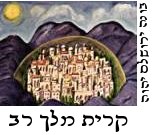
[ The following is related to the fast of Tishah B'Av, which is being observed today.... ]
08.14.16 (Av 10, 5776) Jerusalem is central to the Jewish heart. When religious Jews pray three times a day, they always turn toward the Holy City (i.e., mizrach: מזרח "east"). Synagogues likewise place the holy ark (the place where Torah scrolls are kept) on the wall closest to Jerusalem. Many observant Jews keep small section of an eastern wall of their house unpainted as a sign of mourning for the destruction of the Temple. Every year we close the Passover Seder with the words, La-Shanah Haba'ah Bi Yerushalayim! ("Next year in Jerusalem"). These same words are invoked to conclude the holiest day of the Jewish year, Yom Kippur. Indeed Yeshua called Jerusalem the "City of the great King" (Psalm 48:2; Matt 5:35): It is the place where He was crucified, buried, resurrected, and from where He ascended to heaven. It is also the birthplace of the true church (כלה של משיח) and the focal point of humanity's eschatological future. At the Second Coming, Yeshua will physically return to Jerusalem to restore the throne of King David. Then all the New Covenant promises given to Israel will be fulfilled as the Kingdom of God is manifest upon the earth.
Note: For more on this, see "The Significance of Zion and the Tragedy of Tishah B'Av."
Weeping and Exile...
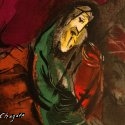
[ The somber fast of Tishah B'Av is being observed today.... ]
08.14.16 (Av 10, 5776) The somber time of Tishah B'Av allows us to express heartfelt grief over the loss of Zion and therefore over the frailty of our human condition. During this appointed time it is appropriate to grieve over our sins and to shed tears that attest to lev nishbar ve'nikdeh, a "broken and crushed heart" (Psalm 51:17). Indeed, during the entire "Three Weeks of Sorrow" we have read selections from the prophets that forewarn of the coming destruction of the Temple (i.e., churban: חֻרְבָּן) and the subsequent exile of the Jewish people (i.e., galut: גָּלוּת). During this time of the year, we listen to the lamentations of the prophet Jeremiah crying out for our repentance...
During the two Tishah B'Av synagogue services, the lights are dimmed and the Aron Hakodesh (Holy Ark) is draped in black (in some synagogues the parochet (curtain) is removed as a sign of mourning). The crowns with tinkling bells are removed from Torah scrolls. Congregants remove their leather shoes and do not greet each other. The cantor leads the prayers readings in a low, mournful voice. The cantillation for the Scripture readings are set to elegiac, sorrowful melodies (for more on this click here).
בָּרוּךְ אַתָּה יהוה אֱלהֵנוּ מֶלֶךְ הָעוֹלָם
אֲשֶׁר עָשָׂנוּ אֲסִירֵי תִּקְוָה
ba·rukh · at·tah · Adonai · E·lo·hei·nu · me·lekh · ha·o·lam,
a·sher · a·sa·nu · a·si·rei · tik·vah

"Blessed art You, LORD our God, King of the universe,
who has made us captives of hope."

Download Study Card
Words and Consequences...

08.14.16 (Av 10, 5776) The midrash notes the morphological similarity between the word devarim (דְּבָרִים), "words," and devorim (דְּבוֹרִים), "bees." The words of Torah can give joy and sweetness to those who heed them (Psalm 19:10), but they are a deadly poison to those who do not: "Just as the honey of the bee is sweet and its sting is sharp, so, too, are the words of Torah." Likewise, our words can either be used to build up, edify, and comfort others, or they can be used to tear down, deliver poison, and cause pain. As it is written in the Book of Proverbs, "Death and life are in the power of the tongue."
מָוֶת וְחַיִּים בְּיַד־לָשׁוֹן
וְאהֲבֶיהָ יאכַל פִּרְיָהּ
ma·vet · ve·chai·yim · be·yad · la·shon
ve·o·ha·ve·ha · yo·khal · pir·yah

"Death and life are in the power of the tongue,
and those who love it will eat its fruits" (Prov. 18:21)

Hebrew Study Card
Our ability to use language is perhaps what most differentiates us from animals -- and what most closely links us to God Himself. Indeed, words (devarim) and rationality (הִגָּיוֹן) are central to tzelem Elohim, the image of God, even as Yeshua represents this image most perfectly as devar Elohim (דְּבַר הָאֱלהִים), the "Word (λόγος) of God" (Heb. 1:3, John 1:1). Just as the Word of God resounded, "Let there be Light, and there was Light (Gen. 1:3), so our words are the medium of how we experience and understand reality. Words, then, can bring forth light and life, though tragically, they can cause darkness and death, too.
Life and death are be'yad lashon - in the "hand of the tongue," an idiom meaning under the control of the tongue.. Our words (and the thoughts they express) have vast spiritual significance and repercussion... Because we are made in the image and likeness of God, words wield spiritual power. Indeed, the Hebrew word for "word" (דָּבָר) also means "thing." When we bless others, we are invoking grace and good will to be manifest in the world, but when we curse others, the opposite effect is intended. The phrase, "those who love it will eat its fruits," suggests that as we speak, think, and imagine, so will come to us: we will eat the fruit of our words and their consequences....
Note: For more on this, see the parashah article, "These are the Bees."
Fight the Good Fight...

08.12.16 (Av 8, 5776) Now more than ever: Choose to fight (ἀγωνίζομαι - "agonize," "struggle") another day. Do not yield to despair or give place to anxiety. Press on and keep fighting the "good fight" of faith (1 Tim. 6:12). You infinitely matter to heaven; your life has great value; you are significant and you are truly loved by our Heavenly Father... There is a "future and a hope" reserved for you (Jer. 29:11); there is "a white stone, and on that stone will be written a new name that no one can understand except the one who receives it" (Rev. 2:17). This promise is given to the "one who conquers" (Τῷ νικῶντι) because of the love and grace of our God. Indeed, by faith we are made "more than conquerors" (lit. "hyper conquerors," ὑπερνικῶμεν) through the Messiah and his love for us (Rom. 8:37).
In our struggle against the darkness, there is an end coming, so don't let your heart grow numb. Never give up hope. God has promised: "I will give you a new heart (לֵב חָדָשׁ), and a new spirit (רוּחַ חֲדָשָׁה) I will put within you. And I will remove the heart of stone (לֵב הָאֶבֶן) from your flesh and give you a heart of flesh" (Ezek. 36:26). Receive God's promise for your soul, since His healing love is what you really need...
Note: I was at a funeral all day today, another somber reminder to "redeem the time..."
Expressing Anger to God...

[ The following entry is related to our Torah portion this week, parashat Devarim... ]
08.12.16 (Av 8, 5776) From our Torah portion this week (Devarim) we read: "You were not willing to go up but rebelled at the word of the LORD your God. And you murmured in your tents and said, 'Because the LORD hates us he has brought us out of the land of Egypt...'" (Deut. 1:26-27). We may decry the childish insolence of the people, we lament their lack of faith, and yet God was still speaking through Moses to Israel... The sages ask whether we can ever be justfiably angry at God, and answer that yes we can, because otherwise we could never love Him "bekhol levavkha," with all our heart (Deut. 6:5). Indeed, how can we claim to love God if we withhold the truth, lie to ourselves, and attempt to hide who we really are from Him? If you are angry at God, he already knows, so why the pretense? Being angry with God is part of being a real person in a real relationship with Him, and allowing yourself to express the truth of your heart to him is a sign of trust. God can "handle" the darker storms of your heart: trust Him to heal you this hour.
Words and Judgment...
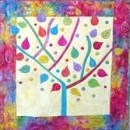
08.11.16 (Av 7, 5776) Teshuvah of the tongue... Yeshua said that as a tree is to its fruit, so is a person's heart is to his speech. Our words arise from an underlying source and root: "The good person out of the good treasure of his heart produces good, and the evil person out of his evil treasure produces evil, for out of the abundance of the heart his mouth speaks" (Luke 6:45). Moreover he forewarned: "I tell you, on the Day of Judgment people will give account for every careless word (πᾶν ῥῆμα ἀργὸν) they speak, for by your words you will be justified, and by your words you will be condemned" (Matt. 12:36-37). Note that the phrase translated "every careless word" can be understood as "every 'workless' word," that is, every vain or thoughtless word spoken, every broken promise, every insincere utterance, and so on. This is part of the meaning of indifference / carelessness toward God. Consider the "conversation" of your life and turn to God for healing and forgiveness....
The "Tone" of Tishah B'Av...

[ The 25 hour fast of Tishah B'Av begins Saturday, August 13th at sundown... ]
08.11.16 (Av 7, 5776) The Book of Lamentations (מגילה איכה) is traditionally recited during Tishah B'Av to remember the destruction of the Holy Temple and other tragedies that have befallen the Jewish people. Lamentations is an acrostic poem that begins with the Hebrew letter Aleph in the word "eichah" (אֵיכָה): "How (eichah) lonely sits the city that once was full of people!" (Lam. 1:1). The sages note that this word "how (eichah)" could also be read as "where are you?" (אַיֶּכָּה, ayekah), God's first question to Adam after he broke covenant in the Garden of Eden (Gen. 3:9). The midrash draws a connection between the lamentation of the LORD over Adam's banishment from Eden and Israel's banishment from Zion (Hos. 6:7). In both cases the problem centers on the failure to ask where God is.
During the Tishah B'Av service at the synagogue, when the cantor reaches the second to last verse of the book, "Hashivenu," he pauses and the congregation recites the verse in unison: Hashivenu Adonai, elekha vena-shuvah; chadesh yamenu kekedem: "Turn us back to You, O LORD, and we shall be turned; renew our days as of old" (Lam. 5:21). Often this verse is repeated and sung to a haunting melody as the scroll is returned to the Ark.
הֲשִׁיבֵנוּ יְהוָה אֵלֶיךָ וְנָשׁוּבָה
חַדֵּשׁ יָמֵינוּ כְּקֶדֶם
ha·shi·ve·nu Adonai e·ley·kha ve·na·shu·vah,
cha·desh ya·me·nu ke·ke·dem

"Turn us back to yourself, O LORD, so that we may return to you;
renew our days as of old" (Lam. 5:21)

Hebrew Study Card
How many people today live in a state of self-imposed exile from the LORD? How lonely... God uses our loneliness and alienation to question our hearts, asking each of us, ayekah – "Where are you?" "Why have you turned away from me and chosen a state of exile?" Our inner pain is meant to provoke us to seek His face. He awaits our only possible response, "Hashivenu!" -- an imperative (demand) for the grace to repent: "You return us (i.e., you cause us to return) so that we may be reunited with you and healed!" We do not appeal to our own resources or strength to undergo this return, but rather trust that God's sovereign grace is sufficient to restore us to His presence. As Yeshua said, "No one can come to me unless the Father who sent me draws him, and I will raise him up" (John 6:44).
The tears of the prophet Jeremiah represent God's compassionate love for the Jewish people; the Book of Lamentations is really God's cry... God cares about the suffering of His people: b'khol tzaratam lo tzar (בְּכָל־צָרָתָם לוֹ צָר) - "In all their affliction he was afflicted" (Isa. 63:9). Even after all the horrors that befell the people of Judah due to God's disciplinary judgment, the LORD still encouraged them to seek Him again. "The faithful love of the LORD (חַסְדֵי יהוה) never ceases, and his compassions never fail. They are new every morning; great is your faithfulness" (Lam. 3:22-23). Our response to the faithful love of the LORD is teshuvah (i.e., תְּשׁוּבָה, "turning [shuv] to God"). In Modern Hebrew teshuvah means an "answer" to a shelah (שְׁאֵלָה), or a question. God's love for us is the question, and our teshuvah – our turning of the heart toward Him – is the answer. We return to the LORD when we truly acknowledge that He is our Father and our King. May we so turn today...
Moses' Miraculous Words...
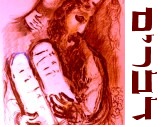
[ The following entry is related to our Torah portion this week, parashat Devarim... ]
08.11.16 (Av 7, 5776) The midrash says that though Moses "stammered" and was "kevad peh" (heavy of mouth), he was empowered to speak fluently whenever the Holy Spirit moved him. Sefer Devarim (the Book of Deuteronomy) is unique among the five books of Torah because it represents Moses' great farewell appeal to follow the LORD bekhol levavkha, "with all of your heart" (Deut. 6:5). In this final book of Torah, Moses - who once described himself as lo ish devarim (לא אִישׁ דְּבָרִים) "a man of no words" (Exod. 4:10), speaks some of the moving words of all of the Holy Scriptures, eloquently calling us to embrace the truth of Torah, to walk in God's love, and to await the final redemption...
Carelessness and Judgment...
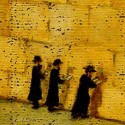
[ The following is related to Tishah B'Av, the traditional date of the destruction of the Temple...]
08.11.16 (Av 7, 5776) Concerning the terrible loss of the Holy Temple and the subsequent exile from the promised land (recalled during Tishah B'Av), we remember God's warning that exile, persecution and progressively worse punishments would decisively befall the people if they would break faith with Him (Lev. 26:14-46). But how could all this have happened? How could the people have lost sight of the great promises of God? In answer to this question we notice that the "rebuke" portion of the tochachah begins with the phrase v'im lo tishme'u li (וְאִם־לא תִשְׁמְעוּ לִי), "if you do not listen to me" (Lev. 26:14), which recalls the Shema and the duty to love the Lord bekhol levavkha, "with all your heart." The sages then point out that the refrain "if you walk contrary to me" (וַהֲלַכְתֶּם עִמִּי בְּקֶרִי) - which occurs several times during the rebuke - really means "if you walk carelessly (i.e., keri: קְרִי) with me." The commentator Rashi notes that the verb karah (קָרָה) means "to befall" or "to happen" and therefore suggests a sense of randomness (the related word mikreh [מִקְרֶה] means "coincidence"). In other words, if the people regarded the events of life as "random," then God would make (seemingly) random trouble arise in their midst. For this reason a careless attitude about the things of God is the first step toward apostasy...
It's been said that the opposite of love isn't hate, but rather indifference, and that explains why the punishments came when the people "left their first love." If you walk carelessly with God, then you may be afflicted with "troubles of love" (i.e., yissurei ahavah: יִסּוּרֵי אַהֲבָה), that is, with various difficulties, intended to help you "come to your senses," to help you wake up, and to cause you return to the LORD for healing... This is a severe mercy of God.
The idea of tochachah ("rebuke") is not simply something for ethnic Israel, of course, since the New Testament likewise warns us that God will punish those who likewise walk carelessly (i.e., keri: קְרִי) with Him. Have you forgotten the exhortation that addresses you as God's children? "My son, do not regard lightly (ὀλιγώρει) the discipline of the Lord, nor be weary by his reproof (תּוֹכֵחָה). For the Lord disciplines the one he loves, and reproves (יוֹכִיחַ) every child whom he receives" (Heb. 12:5-6; Prov. 3:11-12). The Lord charged the assembly at Ephesus that they had let go of their first love. Yeshua therefore urged them: "Remember from what high state you have fallen and repent! Do the deeds (ἔργα) you did at the first; if not, I will come to you and remove your menorah from its place – unless you repent" (Rev. 2:4-5). "God is not mocked (μυκτηρίζω - lit., "to turn up the nose at"), and what a man sows, he also reaps" (Gal. 6:7; Psalm 39:11). There are abiding consequences for the choices we make in our lives. "For you may be sure of this, that everyone who is sexually immoral or impure, or who is covetous (that is, an idolater), has no inheritance in the kingdom of Messiah and God. Let no one deceive you with empty words, for because of these things the wrath of God comes upon the sons of disobedience" (Eph. 5:6-7).
אַשְׁרֵי הַגֶּבֶר אֲשֶׁר־שָׂם יְהוָה מִבְטַחוֹ
ְלא־פָנָה אֶל־רְהָבִים וְשָׂטֵי כָזָב
ash·rei · ha·ge·ver · a·sher · sam · Adonai · miv·ta·cho
ve·lo · fe·nah · el · re·ha·vin · ve·sa·tei · kha·zav

"Blessed is the man who makes the LORD his trust,
who does not turn to the proud, to those who go astray after a lie."
(Psalm 40:4)

Note that the language of tochachah (i.e., the great rebuke of Scripture for indifference / carelessness toward God) may seem severe, but this bespeaks the severe mercy of God, and his great passion that we do not turn away and lose relationship with him.... Understand, then, the imperatives of Scripture as divine appeals to seek life; realize they are impassioned calls from the Lover of your soul to walk with him in love. As C.S. Lewis once said, God cannot give us peace apart from Him, since there literally is no such thing. God's voice of imperative is a reminder that we can only find what we really need with Him...
The Way of Happiness...
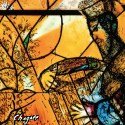
08.10.16 (Av 6, 5776) The Book of Psalms (i.e., Tehillim) begins, "Blessed is the man who does not follow the counsel of the wicked..." (Psalm 1:1). You might think that the "counsel of the wicked" refers to evil scheming, but it is perhaps better to regard it as the common conversation of the godless of this world. Because they are in a state of dread over the future, the wicked "counsel" everyone to amass riches and to look for pleasure (or at least to avoid pain) in the present, without concern for eternity. Just listening to the "news" of the world with its faithless assumptions and its darkened understanding, however, is to follow the counsel of the wicked, and it is easy to be seduced into accepting their false visions of reality. Heeding the philosophy of this world causes holy faith to diminish and faith in falsehood to take its place. The wisdom of this world is deceitful and vain, especially when it is disguised as being existentially relevant to your life. Happy are you if you disavow the world's propaganda and reject its false assumptions! Rashi comments on this verse: "The happiness of a man and his praiseworthiness consist in that he does not follow the advice of the wicked." Brothers and sisters, be careful to guard your hearts and minds: "whatever is true, whatever is worthy of respect, whatever is just, whatever is pure, whatever is lovely, whatever is commendable, if something is excellent or praiseworthy, think about these things" (Phil. 4:8).
King David began the Book of Psalms with the word ashrei (אַשְׁרֵי), meaning "happy" or "fortunate," which the sages link with Moses' last words recorded in the Torah, "Happy are you, O Israel (אַשְׁרֶיךָ יִשְׂרָאֵל); who is like you, a people saved by the LORD, the shield of your help, and the sword of your triumph..." (Deut. 33:29). While Moses spoke to the nation as a whole, however, David spoke to each individual, and therefore he ends the book of Psalms, כּל הַנְּשָׁמָה תְּהַלֵּל יָהּ הַלְלוּ־יָהּ- "Let every soul praise the LORD; Hallelujah!" (Psalm 150:6).
Note: For more on this subject, see "Derekh Tzaddikim: The Way of the Righteous."
Shema of Wisdom...

[ The following entry is related to our Torah portion this week, parashat Devarim... ]
08.10.16 (Av 6, 5776) The Mishnah asks, "Who then is wise?" and answers, "one who learns from everyone" (Avot 4:1). Wisdom, then, requires that you make space and take time to listen to others. "The talkative listen to no one, for they are ever speaking. And the first evil that attends those who do not know how to be silent is that they hear nothing" (Plutarch). Therefore Moses said, "If something is too difficult for you, bring it to me and I will listen" (Deut. 1:17). The sages comment that Moses would not pontificate a decision but would quietly and intently listen – and the solution would be revealed. The same may be said regarding prayer. After you've unburdened your heart of its anxious thoughts - these being "too difficult for you" - then you are made ready to hear God's voice in your midst....
"If, however, you take time and listen more carefully, you hear - how amazing! - you hear silence... In the distance you hear the familiar voice of a dog, you cannot say this bellowing or this voice disturbs the silence. No, this belongs to the silence, is in a mysterious and thus in turn silent harmony with the silence; this increases it" (Soren Kierkegaard: Without Authority, 1846).
Redeemer of Waste Places...
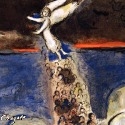
[ The following entry is related to our Torah portion this week, parashat Devarim... ]
08.10.16 (Av 6, 5776) Though it would have taken just two weeks to march directly to the promised land from Egypt, the people were not ready and needed to wander from one dry place to another. Therefore we are told to remember the "whole way" (כָּל־הַדֶּרֶךְ) of our journey: "God led you these forty years in the desert that he might humble you, testing you to know what was in your heart - לָדַעַת אֶת־אֲשֶׁר בִּלְבָבְךָ..." (Deut. 8:2). Yea, God works "all things together for good" - even tragic events such as the destruction of the Temple and the exile of His people, and therefore we are commanded to remember the "whole way" of our journey. "Gather up the leftover fragments, that nothing may be lost" (John 6:12). We "press on to the goal" but also trust that God is able to redeem even the seasons of our lives lived in the waste places. Because of Yeshua, nothing of our lives will be be entirely lost. Amen. ברוך יהוה שגואל את הצער שלנו - "Blessed is the LORD who redeems our sorrows."
Beside Still Waters...
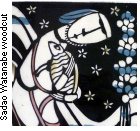
08.09.16 (Av 5, 5776) King David wrote of God's caring guidance: al-mei menuchot yenachaleini – "He leads me beside still waters" (Psalm 23:2). "Still waters," literally the "waters of rest" (מֵי מְנֻחוֹת), represent calmness, quietude, inner peace, and serenity... The trusting heart is able to let go of fearful negative thoughts and to "be still and know" God's Presence (Psalm 46:10). Our Savior described himself as the Good Shepherd (הָרעֶה הַטּוֹב) who makes us lie down in green pastures, who leads us to still waters, and who restores our souls (the Hebrew verb translated "restore" is an intensive passive of the verb shuv, "to turn" (שׁוּב), indicating that the Shepherd causes our souls to return to God). As he prophesied, "My sheep hear my voice, and I know them, and they follow me. I give them eternal life (חַיֵּי עוֹלָם), and they will never perish, and no one will snatch them out of my hand" (John 10:27-28). Thank God. Yeshua is the one who makes for us the paths of righteousness; He leads us on the way to the Father (John 14:6).
The Bread of Life...

08.09.16 (Av 5, 5776) Adonai ro'i lo echsar - "The LORD is my shepherd, I will not lack" (Psalm 23:1). The sages comment here that true satisfaction is found in "spiritual food," which is something different than physical food... Thus the wicked, even in their affluence, are never satisfied and always seeking more. Spiritual food, on the other hand, is provided when we genuinely seek the will of God as our highest goal and end. As the prophet Job said, "I have not departed from the commandment of his lips; I have treasured the words of his mouth more than my portion of food" (Job 23:12), so Yeshua spoke of lechem ha'nistar (לֶחֶם הַנִסְתָּר), the "hidden bread" he ate to sustain him in his mission (John 4:31-34). Earthly bread is a shadow of a deeper reality. Just as physical bread is a means to physical life, so "man shall not live by bread alone, but by every word that God speaks" (Deut. 8:4; Matt. 4:4). Yeshua is the true manna, the "Living Bread" (לֶחֶם חַיִּים) from heaven that sustains us in "the desert" of this world. He is the One who truly satisfies the heart by removing the inner pain of our emptiness and hunger. As it is written in Torah, "set the Bread of the Presence (לֶחֶם פָּנִים) on the table before me always" (Exod. 25:30).
Brother Lawrence said, "If I were a preacher, I should preach nothing else but the practice of the presence of God. There is not in the world a way of life more sweet, more delightful than continual converse with God." Indeed, do not most of our problems come from just this – losing sight of reality, failing to partake of God's Bread of Presence? Yeshua said, "Live in me, and I will live in you" (John 15:4). We must make a sacred resolution to abide in reality, to stay united with Him. As David said: shiviti (שִׁוִּיתִי) - "I have set the LORD always before me - because He is at my right hand, I shall not be shaken" (Psalm 16:8). But how did David "set the LORD" before Him if He did not open the eyes of faith to behold God's Glory?
He Carries us Through...

[ The following entry is related to our Torah portion this week, parashat Devarim... ]
08.09.16 (Av 5, 5776) From our Torah this week (Devarim) we read: "The LORD your God carried you, as a man carries his son, all the way that you went until you came to this place" (Deut. 1:31). Part of the miracle of faith is coming to believe that you matter – that your thoughts, words, and deeds are of interest to God. You may be tempted to regard yourself as unseen and powerless before the Creator of the universe. How is it possible for anyone to serve the Infinite One, since "even the heavens, and the heaven of heavens, cannot sustain You" (1 Kings 8:27)? Are we not made of clay, whose foundation is but dust? (Job 4:19). Here the miracle of faith believes that God, the LORD and Source of all life, seeks relationship with us, and that He makes place within Himself to hear us, to engage our lives, and to walk with us... God is LORD over all possible worlds, and his infinite concern reaches to the uttermost. Indeed, "the Word was made flesh and dwelt among us:" God emptied himself (κενόω) and clothed himself with human dust so that we could be touched by His love. The LORD carries us through our exile so that we might know and trust him...
"And just as we have borne the image of the man of dust,
so we shall also bear the image of the man of heaven" (1 Cor. 15:49).
The Voice of Our Words....
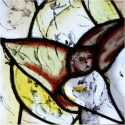
08.09.16 (Av 5, 5776) According to Jewish tradition, it was on Tishah B'Av (the ninth of Av) when the people wept over the report of the spies, a lapse of faith so serious that it provoked God to decree that the very generation He redeemed from Egypt would die in the exile of the desert (Num. 13-14). As Moses later recounted this tragic event, he says something peculiar: "The LORD heard the 'voice of your words' (קוֹל דְבַרִים) and was angry..." (Deut. 1:35). The grammar here is unusual, for the text could have simply said, "the LORD heard your words," but the Torah adds something else, the idea of "emotional tone," or the manner, the words were spoken... Sometimes it's not so much what you say that matters, but how you say it. Words of the heart are expressed more by tone, the "voice of the words," than by the words themselves...
The heart has its own voice regardless of the words we are able to articulate. For instance, if you love someone, then really love them -- and abhor being halfhearted. Being hot or being cold is better then being tepid, because then you are being honest, and honesty will always evoke a genuine response from heaven...
Zion's Indefatigable Vision...

[ The Fast of Av (i.e., Tishah B'Av) begins August 13th at sundown this year... ]
08.08.16 (Av 4, 5776) The solemn holiday of Tishah B'Av represents the yearning of the heart for the establishment of the Kingdom of God upon the earth... As Yeshua taught his disciples to pray: tavo malkhutekha (תָּבא מַלְכוּתֶךָ): "Thy Kingdom come"; ye'aseh retzonkha (יֵעָשֶׂה רְצוֹנְךָ): "Thy will be done," ba'aretz ka'asher na'asah va'shamayim (בָּאָרֶץ כַּאֲשֶׁר נַעֲשָׂה בַשָּׁמָיִם) "on earth, as it is in heaven" (Matt. 6:10). Now if you say that the King of the Jews lives inside your heart by faith (Matt. 2:2), and if the King of the Jews calls Jerusalem the "City of the Great King" (Psalm 48:2, Matt. 5:35), then heed the Spirit's call to "pray for the healing of Jerusalem" and the final redemption to come. At the End of the Age, the Messiah will indeed return to establish Zion as a praise upon the earth (Isa. 62:7).
שַׁאֲלוּ שְׁלוֹם יְרוּשָׁלָםִ
יִשְׁלָיוּ אהֲבָיִךְ
sha·a·lu · she·lom · ye·ru·sha·la·yim
yish·la·yu · o·ha·va·yikh

"Pray for the peace of Jerusalem;
May those who love you be at peace" (Psalm 122:6)

Hebrew Study Card
Your greatest need...

[ The following entry is related to our Torah portion this week, parashat Devarim... ]
08.08.16 (Av 4, 5776) Also from our Torah for this week (i.e., Devarim) we read: "For the LORD your God has been with you: you have lacked nothing" (Deut. 2:7). With God you have everything you need; without Him, you will never be truly satisfied. "Our hearts are restless until they find their rest in Thee," which is to say that the merry-go-round of desire for things of this world is ultimately vain and unfulfilling. Indeed, it is slavery to be attached to unslakeable desire; it is madness to restlessly desire more and more. God has set eternity within our hearts (Eccl. 3:11), a hunger that only heaven can fulfill, but we try to find happiness with the trinkets and junk of this passing realm.... When the LORD is with us – and when we dwell in the simplicity of that reality – we lack nothing: "For the LORD God is a sun and shield; the LORD bestows favor and honor; no good thing does he withhold from those who walk uprightly. O LORD of hosts, blessed is the one who trusts in you."
כִּי שֶׁמֶשׁ וּמָגֵן יְהוָה אֱלהִים
חֵן וְכָבוֹד יִתֵּן יְהוָה
לא יִמְנַע־טוֹב לַהלְכִים בְּתָמִים
יְהוָה צְבָאוֹת אַשְׁרֵי אָדָם בּטֵחַ בָּךְ
ki · she·mesh · u'ma·gen · Adonai · Elohim
chen · ve'kha·vod · yit·ten · Adonai
lo · yim·na · tov · la·cho·le·khim · be'ta·mim
Adonai · Tze·va·ot · ash·rei · a·dam · bo·te·ach · bakh

"For the LORD God is a sun and shield;
the LORD bestows favor and honor;
no good thing does he withhold from those who walk uprightly.
O LORD of hosts, blessed is the one who trusts in you."
(Psalm 84:11-12)

Are you Willing to Ascend?

[ The following entry is related to our Torah portion this week, parashat Devarim... ]
08.08.16 (Av 4, 5776) From our Torah portion this week (i.e., Devarim) we read: "But you were not willing to ascend (וְלא אֲבִיתֶם לַעֲלת), but became bitter (מָרָה) against the Word of the LORD your God" (Deut. 1:26). Moses' rebuke was not that the people were afraid to conquer the land as much as that they had lost heart and no longer desired to take hold of God's promise. The people gave up their dream; they forsook their hope; and they had lost the "devotion of their youth, their love as a bride, how they followed the LORD in the desert, into a land not sown" (Jer. 2:2). The people's failure was on two levels: First they lapsed in faith by abdicating trust in God's word, and second, they had lost the passion of their first love. In light of this, the sages say that the greater problem was that of losing heart, since the heart directs the will to believe in the miracle of God, or not...
Moses' rebuke of the people's heart condition recalls the sober warning Yeshua gave to the Ephesian believers: "I know your works, your toil and your patient endurance, and how you cannot bear with those who are evil, but have tested those who call themselves apostles and are not, and found them to be false. I know you are enduring patiently and bearing up for my name's sake, and you have not grown weary. But I have this against you, that you have abandoned the love you had at first. Remember therefore from where you have fallen; repent, and do the works you did at first. If not, I will come to you and remove your menorah from its place, unless you repent" (Rev. 2:2-5). Likewise the author of the Book of Hebrews commented: "And to whom did he swear that they would not enter his rest, but to those who were disobedient? And with whom was he provoked for forty years? Was it not with those who sinned, whose bodies fell in the desert? So we see that they were unable to enter because of unbelief" (Heb. 3:17-19). The question of our faith is essential: "It is a fearful thing to fall into the hands of the living God" (Heb. 10:31).
Seeking Things Above...

[ The theme of teshuvah (repentance, turning to God) is central during the Three Weeks... ]
08.08.16 (Av 4, 5776) "How long will you go limping between two different opinions? If the LORD is God, follow him; but if Baal, then follow him" (1 Kings 18:21). These words of Eliyahu ha-navi (Elijah the prophet) are meant for us to hear today, during this season of teshuvah leading up to Tishah B'Av. We are being called to make up our minds (metanoia) and turn (shuv) to the LORD. After all, what is more important to you than your relationship with the LORD God of Israel? Is there anything more important than this?
If we are spiritually identified with Yeshua, we are "dead" to this age (olam hazeh) and awakened to a realm that transcends the appeals of the flesh (olam habah). We no longer live chayei sha'ah (חַיֵּי שָׁעָה, "fleeting life") but chayei olam (חַיֵּי עוֹלָם, "eternal life"). Therefore "if you have been raised with Messiah, seek the things that are above (τὰ ἄνω ζητεῖτε), where the Messiah is seated at the right hand of God; focus your thoughts on the things above - not on things here on earth - for you have died, and your life has been hidden with Messiah in God" (Col. 3:1-4). The aorist verb "you have died" indicates "you have died once for all," that is, that this is a condition granted by the power and agency of God on your behalf. You don't "try to die" to the flesh; you accept that God has killed its power over you through Yeshua...
To "de-cide" means to "cut away" other options. Yeshua tells us to take up the cross and die because that which is dead no longer suffers from ambivalence and carnal inner conflict... There are no "half-measures" here; when we accept that we have already been crucified with Messiah, we confess that our true life is not here, in this world, but is bound up in Him, and that God alone is our ultimate concern and end. In that sense, the life we now live in the flesh "catches up" with the truth and power that God has decreed for our salvation.
By faith resolve to understand that you are dead to this world; you are dead to sin's power; you are set free and no longer enslaved to the deception of the worldly matrix, etc. Now you are made alive to an entirely greater and more powerful order and dimension of reality, namely, the spiritual reality that is not disclosed to the vanity of this age. Therefore we are to consciously focus our thoughts (φρονέω) on the hidden reality of God rather than on the temporal world that is passing away: "For we are looking not to the things that are seen but to the things that are unseen. For the things that are seen are transient (i.e., "just for a season," καιρός), but the things that are unseen are eternal" (2 Cor. 4:18).
Tishah B'Av - the Ninth of Av...
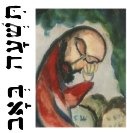
[ Note that Tishah B'Av is postponed one day this year because the 9th of Av falls on the weekly Sabbath... The fast will begin, then, on Saturday August 13th at sundown... ]
08.07.16 (Av 3, 5776) We are in the midst of the "Three Weeks of Sorrow" that began with the Fast of Tammuz and ends with the solemn fast of Tishah B'Av. Spiritually, these three weeks are marked by a renewed called for teshuvah (repentance), and the weekly readings from the prophets all warn about imminent judgment from heaven. Indeed, the Sabbath that immediately precedes the fast of Tishah B'Av is called Shabbat Chazon (the "Sabbath of Vision") because the Haftarah that is read (i.e., Isa. 1:1-25) describes the vision of the prophet Isaiah regarding the imminent destruction of the Temple:
"Hear, O heavens and give ear, O earth,
For the LORD has spoken;
Though I brought up and raised My children,
They have rebelled against me." (Isa. 1:2)
When it was first recorded, Isaiah's vision of the destruction was still future, and the Jews still had a chance to repent before the great tragedy befell them. However, since they refused to turn back to God, calamity overtook them. Today the Haftarah is traditionally chanted to the same haunting melody as Megilat Eichah (Lamentations), written by the prophet Jeremiah, who was an eyewitness to the destruction and fall of Jerusalem.
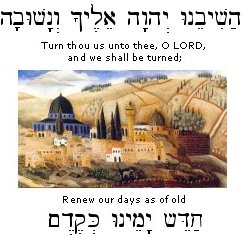 |
During the last nine days of the Three Weeks of Sorrow it is common to confess the sins in our lives that likewise contribute to the lack of God's Presence in our midst. Hashivenu Adonai, elecha vena-shuvah; chadesh yamenu kekedem: "Turn us back to You, O LORD, and we shall be turned; renew our days as of old" (Lam. 5:21).
Though Shabbat Chazon is a time of mourning, it is also a time for hope. The Torah reading for this Sabbath is always parashat Devarim, the first portion of the Book of Deuteronomy. In this reading, Moses details the victorious battles with Sihon the king of Amorites and Og the king of Bashan. Because it speaks of God's victory, the sages recommended envisioning the future Temple that will be built by the Messiah at this time. According to Jewish tradition, after the Messiah comes and restores Israel, Tishah B'Av will become one of the happiest days of the year (and may He arrive soon and in our days).
Parashat Devarim...

08.07.16 (Av 3, 5776) Our Torah reading for this week is the very first portion from the Book of Deuteronomy (i.e., Devarim: דְּבָרִים), which is always read on the Sabbath that immediately precedes the doleful holiday of Tishah B'Av (תשעה באב). In Jewish tradition, this special Sabbath is called "Shabbat Chazon" (שַׁבַּת חַזוֹן), "the Sabbath of Vision," since the Haftarah that is read (i.e., Isa. 1:1-25) comes from the vision of the prophet Isaiah regarding the destruction of the Holy Temple in Jerusalem. In Jewish tradition and liturgy, teshuvah (repentance) and viduy (confession of sin) are the themes of this preparatory Sabbath.
Thank you for your prayers for my health and this ministry, friends... Shavuah tov.
Suffering and Healing...

08.05.16 (Av 1, 5776) I've written about the problem of suffering in more or less intellectual terms over the years, though I think the real problem, when reflected upon emotionally, is the fear of being lost, abandoned, and made an orphan forever and ever. It is the child's cry for his father's touch or his mother's warm embrace denied and left ungiven... Is that not something of the fear, after all? As the late Henri Nouwen once said: "Not being welcome is your greatest fear. It connects with your birth fear, your fear of not being welcome in this life, and your death fear, your fear of not being welcome in the life after this. It is the deep-seated fear that it would have been better if you had not lived." The central message of the cross of Messiah is that God regards you as personally worth dying for, and indeed, that your life is worth the exchange of His own... You are treasured; you are loved. This is of first importance (1 Cor. 15:3-5). The Word of Life is - above all else - an invitation, a cry of welcome, that sings out to you in your loneliness and shame. The core of the battle is here - whether you will decide to trust in God's love or shrink back into the places of darkness, isolation, and pain. Yeshua says, "Come to me; I love you, I accept you; I receive you; please, be welcome with me; I will take your hand, I will be with you..."
The real question, for some of us, is whether you want to be loved, after all. Some people, so sadly, know nothing other than the pain of being outside, rejected, unwanted... and for them it is a great, terrible struggle to open their hearts to love. May God bring His compassion to bear upon them. Shabbat shalom and chodesh tov, chaverim....
Following Yeshua...

08.05.16 (Av 1, 5776) When Yeshua says "follow me," he doesn't mince words or ask for the impossible; neither does he seek "admirers" or the celebrity of mere men. To follow Yeshua means to walk along the same road he did, not in the physical sense, of course, but in the way or "how" of the road... To "walk as he walked" means your life will share his heart, vision, and spirit as much as is possible in your present circumstances. The life of the Teacher is the road; his heart voices the spirit that calls the disciple ahead; he prepares a place for you in the communion of his love. May you press on toward the goal of the upward call in Yeshua the Messiah (Phil. 3:14).
"What dreadful untruth it is to admire in relation to the truth instead of imitating it... When there is no danger, when there is dead calm, when everything is favorable to Christianity, it is all to easy to confuse an admirer with a follower, and this can happen very quietly; the admirer can die in the delusion that the position he took was the true one. Give heed, therefore, to the contemporaneity of Christ" - Soren Kierkegaard (Practice in Christianity).
Inner and the Outer...

08.04.16 (Tamuz 29, 5776) Our Torah portion this week (Mattot) begins with Moses instructing the leaders of the tribes, saying: "If a person makes a vow (נֶדֶר) ... he shall not break his word; but he shall do according to all he has said" (Num. 30:2). Notice that the phrase "break his word" literally means to profane (חָלַל) his word, which implies that breaking a promise is a type of spiritual defilement... If we do not honor and respect our words, we lose a sense of meaning, and the substance of what we say and think becomes unstable. Such double-mindedness leads to shame, since without inner conviction we become inwardly divided and fragmented, so that we no longer trust ourselves... Being honest (יָשָׁר) implies that what we say and what we mean are unified. An honest person doesn't play games with words but understands that communication is a sacred trust...
We must be careful with our words so that we do not mislead others. This is called shemirat ha'lashon (שְׁמִירַת הַלָּשׁוֹן), or "guarding of the tongue." Yeshua warned us not make formal oaths, but instead to be trustworthy in our words: let your "yes" mean yes, and your "no" mean no... The Talmud agrees by saying that 'no' is an oath and 'yes' is an oath." Our words are to be regarded as sacred, as an expression of truth. God has made us inviolable promises, and we are never to play games with that. Just as His word is sacred, so we should strive to be sacred in our speech, too....
The Torah states, "You shall not put a stumbling block (מִכְשׁוֹל) before the blind" (Lev. 19:14). In addition to its literal meaning, the word "blind" figuratively refers to a person unaware of all the facts and who is therefore made vulnerable. Someone who misdirects the blind deceives them, and this violates the 9th commandment not to bear false witness (Exod. 20:16; 23:1). Such deception is called genevat da'at (גְּנֵבַת דַעַת), or "stealing the mind," since it defrauds the other person's trust. For example, it is common practice for politicians to disclose only what they think others need to know, and therefore they offer incomplete versions of truth for the sake of their own self-serving interests. Lying to others is a violation, then, of both the commandment not to steal and the commandment not to bear false witness. "The righteous person hates lies" - דְּבַר־שֶׁקֶר יִשְׂנָא צַדִּיק (Prov. 13:5).
"Deliver me, O LORD, from lying lips, from a deceitful tongue" (Psalm 120:2). The sages say that the virtue of eminut (אֲמִינוּת), or trustworthiness, begins with learning to trust others... Parents are therefore responsible to fulfill their commitments to their children. Rabbi Zera said, "One should not say to a child, 'I will give you something' and then not do so, since that teaches the child to lie" (Sukka 46b). People learn to lie from a sense of betrayal, from the mismatch between professed words and reality. The breakdown of trust leads to the evasive use of words to protect ourselves. We tell others what we think they want to hear or we mislead them to keep ourselves safe. Breaking promises wounds others, and children can learn to become hardhearted, untrusting, and fearful of intimacy as a result.
The Fruit of our Words...

[ Our Torah this week (Mattot) discusses various laws regarding vows and oaths... ]
08.04.16 (Tamuz 29, 5776) Yeshua said that as a tree is to its fruit, so is a person's heart is to his speech. Our words arise from an underlying source and root: "I tell you, on the Day of Judgment people will give account for every careless word (πᾶν ῥῆμα ἀργὸν) they speak, for by your words you will be justified, and by your words you will be condemned" (Matt. 12:36-37). First note that the phrase translated "every careless word" can be understood as "every 'workless' word," that is, every vain or empty word spoken, every broken promise, every insincere utterance, and so on. Second, note that there is a relationship between naming and being in Hebrew thought, and indeed the Hebrew word davar (דּבר), usually translated as "word," can also mean "thing." This suggests that our words define reality - not in an absolute sense, of course - but in terms of our perspective and attitude, and for that we are held responsible before the LORD. Since our words express our thoughts, Yeshua wants us to make up our minds: "Either make the tree good and its fruit good, or make the tree bad and its fruit bad, for the tree is known by its fruit."
And may it please our gracious and long-suffering LORD to answer the cry of our heart: "Let the words of my mouth and the meditation of my heart be acceptable in your sight, O LORD, my Rock and my Redeemer" (Psalm 19:14). Amen...
Words of the Heart...

08.04.16 (Tamuz 29, 5776) During his lectures on Jewish values, Joseph Telushkin asks his audience if they can go 24 hours without saying any unkind words about, or to, anybody. Most people say no, they can't. Rabbi Telushkin then commends them for their honesty, but then points out that if he had asked them if they could go 24 hours without drinking alcohol and they likewise said they couldn't, wouldn't that mean they have a serious drinking problem? (Words that Hurt). His point is that if you can't go 24 hours without saying unkind words about others, you have lost control of your tongue. As Yeshua explained, the tongue expresses the condition of the heart, since "from the abundance of the heart the mouth speaks" (Luke 6:45). Therefore the root issue concerns the heart (לֵב), the "midst of the self" that wills, desires, and chooses how to interpret and describe the world. If we choose to see from a heart of fear, we will tend to use our words as a weapon; but if we see with a heart of faith, we will extend compassion and seek to build others up....
In the Book of Proverbs we read, "When words are many, transgression is not lacking, but whoever restrains his lips is wise" (10:19). The Chofetz Chaim comments: "When people are preparing a telegram, notice how carefully they consider each word before they put it down. That is how careful we must be when we speak." As James admonishes us: "Let every person be quick to hear, slow to speak, slow to anger" (James 1:19).
בְּרב דְּבָרִים לא יֶחְדַּל־פָּשַׁע
וְחשֵׂךְ שְׂפָתָיו מַשְׂכִּיל
be'rov · de·va·rim · lo · yech·dal · pa·sha
ve'cho·sekh · se·fa·tav · mas·kil

"When words are many, transgression is not lacking,
but whoever restrains his lips is wise"
(Prov. 10:9)

Since words represent thoughts, the use of our tongues has to do with how we choose to think... "Think on these things..." We are instructed to "take every thought captive" (αἰχμαλωτίζω, i.e., lead away as a prisoner) to the obedience of Messiah... It is wise to restrain our speech, because, after all, we often have no idea what we are talking about, and therefore our words can become unruly and even dangerous. Whenever we open our mouth to speak, Heaven is listening (Matt. 12:36-37).
Hermeneutics of Suffering...

[ The following entry briefly explores some aspects of how we are to understand suffering from a Biblical perspective... It is only a very brief discussion of a complex subject! ]
08.03.16 (Tamuz 28, 5776) Philosophically considered, suffering is a problem of meaning, since without a coherent narrative of why we suffer, our sense of order, intelligibility, and even our very sanity may be threatened. The problem of suffering is therefore the problem of interpreting our life experiences without succumbing to the threat of semantic nihilism and despair. Faith justifies our struggle, giving it meaning, purpose, and a glorious end; an honest conviction must give voice to our anguish and yet still be able to say "yes" to the validity and significance of hope itself. We walk by faith, not by sight; we make visible what is unseen; we mediate the flux and changes of life through connecting with the Eternal.
The existential problem of suffering is really a problem that arises from faith, not unbelief... Indeed, suffering is often most keenly felt within the framework of a theology that esteems God's power and will as sovereign and absolute, since then the experience of suffering must be reconciled with the all-encompassing divine perfection. Is suffering something "inside" or "outside" of God's sovereign purposes for our lives? Surely the One who knows the number of the hairs on our head also knows the anguish that lacerates our hearts in grief; surely the One who cares for the lilies of the field also watches over the sheep of his pasture... But in either case, we are confronted with painful experiences, and this leads us to ponder why a loving and all-powerful God would permit suffering in our lives.... Are we to passively accept its presence in submission to God or are we permitted to protest it, to lament our fate, and even to complain to heaven about our troubles? Does faith in God's infinite perfections imply that this is the "best of all possible worlds" or does the occurrence of seemingly gratuitous suffering defy the "comfort of meaning" surmised in our theological rationalizations?
The ancient pagan world generally believed that suffering was the manifestation of divine wrath provoked by the impiety of the sufferer. This is the basic idea of "karma," or reciprocal justice, found in many eastern world religions, though karma is also expressed in terms of punishment for disobedience to God's will given in the Torah, and the New Testament also includes the principle that "what a man sows, that shall he also reap" (Gal. 6:7-8). However, as the story of the Book of Job reveals, the righteous (not the wicked) can and do suffer, and therefore appealing to divine justice as a modality of moral reciprocity cannot suffice to explain all suffering, and indeed the great suffering of Yeshua, his vicarious mesirat ha'nefesh (self-sacrifice), vindicated not only God's justice but also his love and salvation. Surely Yeshua was not a victim of deserved suffering, though by his suffering we find healing and life.
In this connection we should note that the Scriptures simply do not present a "monolithic" or uniform explanation for all cases of suffering. In general terms, the Torah of Moses regards suffering as punishment from God, and the narrative portion of earliest human history begins with the transgression at Eden which resulted in the just verdict of exile from paradise and spiritual death (Gen. 3). Other examples abound. Adam and Eve's firstborn son Cain was doomed to wander the earth in punishment for the murder of his brother (Gen. 4); the great flood destroyed all life on earth except for the family of Noah and those animals that were preserved in the ark (Gen. 6); the Tower of Babel was upended by God because of the globalist secular vision of Nimrod (Gen. 11); the cities of Sodom and Gomorrah were destroyed because of the wickedness of their inhabitants (Gen. 18-19), and so on. After the Israelites were rescued from Egypt during the great Exodus, they were brought into covenant with God at Sinai. The terms of the Sinai Covenant made provision for divine retribution: blessing would come for obedience and the curse would come for disobedience (Deut. 11:26-28). God would visit the iniquity of the fathers upon their children and children's children for breaking faith with him (Exod. 20:1-5). Indeed Moses' repeated exhortations to Israel culminate in the grave warning that sin – both national and individual - would lead to great tribulation, exile, and progressively more intense sufferings (see the "tochechah" sections of Lev. 26:16-39 and Deut. 28:15-68). Tragically, the Sin of the Spies led to the judgment that the Exodus generation was doomed to perish in the desert as punishment for denying the truth of God's promises (Num. 13-14). Moreover, the later history of ancient Israel in the promised land – both with the advent of the "judges" and the later rise of the two kingdoms – presents the same theme of judgment for sin that would inevitably lead to exile, captivity, and hardship. The Hebrew prophets, of course, explained the relationship between the people's suffering and their impiety, and they often lamented the harrowing times of trouble that would befall Israel if they refused to repent from their sins...
Despite these examples of suffering as a punitive response from heaven, however, the Scriptures also provide other interpretations for suffering that transcend the idea of karma and "retributive justice." For instance, Israel's afflictions are said to not be based on God's harsh justice but should instead be understood as the means of imparting discipline to God's people (Deut. 8:5, Amos 3:2, Prov. 3:12). In other places suffering is understood to "test the righteous" (Psalm 11:5; James 1:12), refining their character and helping them to grow in godliness (James 1:3-5; Psalm 119:71; 1 Cor. 11:32). In yet other places suffering is regarded as simply inexplicable, or known only to God (for example, see Luke 13:1-3; John 9:1-3). Perhaps the most important understanding of suffering as something more than corrective punishment for sin is revealed in the Suffering Servant and the concept of vicarious atonement (Isa. 52:12-53:12). At the cross of Calvary the Messiah willingly took upon himself unspeakable suffering and anguish of heart to give us eternal healing and life... The Scriptures attest that all suffering will ultimately be healed in the world to come, despite the present appearances of reality (Mal. 3:16-17; Rom. 8:18-39). Because of Yeshua, all our suffering will be reconciled with a promised future state that is unimaginably comforting and that will eternally vindicate God's love and justice (Dan. 12:2-3; Isa. 25:8-10; Rev. 21:4-7).
The Kobriner (i.e., Rabbi Boruch Yosef Sack) once said: "When a man suffers tribulation, he should not say 'this is evil,' for the Lord sends no evil. He should rather say: 'I am undergoing a bitter experience.' It is like a bitter medicine which a physician prescribes to help cure the patient. Indeed "every good gift and every perfect gift is from above, coming down from the Father of lights (אֲבִי הַמְּארת) with whom there is no variation or shadow due to change" (James 1:17).
Still, there are heart-rending cries of lament in Scripture, even complaints directed toward God for our present miseries and troubles (Hab. 1:2-4; 13; Jer. 12:1-4, Psalm 13:1-2, etc.). The Scriptural inclusion of complaint, lament, heartache, grief, and so on indicate that that God is not offended at our lamentations of heart. How do we handle seemingly unanswered prayer? How long will God hide his face? Why do the wicked prosper? Why do the rulers of this world set themselves against the Lord and His anointed? Why does God withdraw, refraining to intervene and help? Why the criminality, vice, and depravity of the world? Why the rise of Herod? Why the Holocaust? Why Christian persecution throughout the world?
The Book of Job, of course, is the prime example in Scripture that seeks to explore the question of why the righteous suffer... Job's friends offer the "traditional view" that the righteous do not suffer, that suffering is always caused by sin, yet at the outset of the book we learn the that righteous Job will be tested by God in a "wager" with the accusing angel (i.e., the devil), and therefore we come into the story knowing beforehand that the "karmic" view is not applicable in this case. When an exasperated Job finally and dramatically accuses God of injustice and calls him to court, God intervenes and reveals his overmastering power and inscrutable wisdom within the whirlwind of created reality.... In response, Job's heart is softened and he repents in "dust and ashes" (Job 42:6). Nevertheless, the reason for Job's suffering remains unexplained and left unanswered. Note, however, that the narrative implies that the assumption of karma may rightly be questioned and challenged. After all, at the end of the story God was angry at Job's friends for their supposed "defense" of Him, but he blessed Job despite his grievous protest and stridulent complaints.
Why are we taught to bless the Lord for the evil as well as for the good? Because the Lord does everything for the good of man... Therefore, in the face of adversity or distress, we affirm gam zu l'tovah (גַּם זוּ לְטוֹבָה) this too is for good, even if at present that good is hidden from view. Our faith says that suffering works a greater end in compassion than otherwise would be the case were it not prescribed...
Lastly, the Book of Ecclesiastes interprets suffering as essentially unexplainable, with good fortune and bad befalling both the pious and impious alike, without discernible reason. Here are a few quotes from this profoundly existential work of theological philosophy, written thousands of years ago: "Meaningless! Meaningless!" says the Teacher. "Utterly meaningless! Everything is meaningless" (Eccl. 1:2). "In the place of judgment – wickedness was there, in the place of justice – wickedness was there" (Eccl. 3:16). "When times are good, be happy; but when times are bad, consider: God has made the one as well as the other. Therefore, you cannot discover anything about your future.... No one knows when their hour will come: As fish are caught in a cruel net, or birds are taken in a snare, so people are trapped by evil times that fall unexpectedly upon them" (Eccl. 7:14; 9:12). "There is something else vexing that occurs on earth: the righteous who get what the wicked deserve, and the wicked who get what the righteous deserve. This too, I say, is meaningless" (Eccl. 8:14). "So I reflected on all this and concluded that the righteous and the wise and what they do are in God's hands, but no one knows whether love or hate awaits them" (Eccl. 9:1). In the end Kohelet is "agnostic" about the "why" of suffering, though he states that the best we can do is pragmatically keep the commandments of God for the sake of prudence, even if this life seems absurd or vain (Eccl. 12:1-14).
The sages said: "The Lord says to us, 'You shall be holy' (Lev. 19:2). If we do not choose to be so, He compels us through suffering. Therefore we should avoid suffering by honoring our parents, keeping the Sabbath day, and performing the other commandments. If God does send us afflictions, however, we must not rationalize them, but feel them, and allow them to move us to do teshuvah...
This brief overview of the way Scripture explains suffering is meant to guard us from taking an overly simplistic approach about such a sensitive subject. While there are valid reasons for connecting suffering with acts of moral disobedience, it is a mistake to assume that this exhausts all we can say on the subject. Indeed, it is misguided to surmise there is a single answer to the problem of suffering revealed in Scripture, and indeed Scripture itself presents various perspectives to interpret its purposes. In some cases suffering may indeed be punitive, while in other cases it may be disciplinary, corrective, or even refining. In yet other cases suffering may be enigmatic and mysterious: only God knows why Job suffered, why the man was born blind, or how the suffering of Yeshua effects vicarious atonement for those who trust in him. Indeed the most sacred place of all cosmic history was shrouded in the darkness that covered the cross as our Savior bore our sins and carried our iniquities. The dark night of the soul, the garden of His pain, the agony and passion of his broken heart – all bespeak the most grievous suffering borne by the most loving of hearts...
Suffering should help us come to teshuvah, to move us to change our thinking, and to bring us close to God. Merely changing your outer circumstances will not bring lasting remedy, however, since "wherever you go, there you are," and that means your pain will pursue you to other circumstances. The real cure is repentance – turning to God and praying from the heart, asking God for mercies and healing.
In the end, suffering must be understood eschatologically, as a matter of faith, wherein every tear will be wiped from our eyes and God's love and righteousness will forever be realized within us. The Spirit celebrates the victory of faith that overcomes the power of death and decay. He is Risen! Yeshua is the Center of all meaning and purpose in the midst of our suffering, and His comfort is more than enough to sustain us on the way. Amen.
God's True Name...
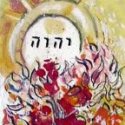
08.03.16 (Tamuz 28, 5776) God's Name is YHVH (יְהוָה), which means "He is Present." The Name is formed from the words hayah ("He was"), hoveh ("He is"), and yihyeh ("He will be"): הָיָה הוֶה וְיִהְיֶה, indicating God's omnipresence. Note that all the letters of the Name are "vowel letters," which mean they evoke breath and life. This is the Name revealed to Moses thousands of years before the advent of other religions such as Islam (Exod. 3:14), and indeed it is the Name associated with the nishmat chayim (נִשְׁמַת חַיִּים), the "breath of life," imparted to Adam in the orchard at Eden (Gen. 2:4). It is therefore the original Name of God "breathed out" to mankind. The Name Yeshua (יֵשׁוּעַ) means "YHVH saves." There is no other Savior beside Him, there is no other Name, there is no other LORD. His is "the Name above all other Names" (Phil. 2:9-11). "For I am the LORD your God, the Holy One of Israel, your Savior." Only Yeshua the Messiah can deliver you from the wrath to come (1 Thess. 1:10).
Trust despite darkness...

08.02.16 (Tamuz 27, 5776) The reason for what happens in our lives is often (always?) beyond our understanding, yet the righteousness of God's plan – even if undisclosed to us - must be accepted by faith. As it says: "As the heavens are higher than the earth, so are my ways higher than your ways and my thoughts than your thoughts" (Isa. 55:9). The refusal to accept what cannot be understood is to worship the powers of the mind, and to elevate the role of human reason above even God Himself. Faith accepts God's goodness and trusts in his care, even if that means we find ourselves walking in the dark: "Let him who walks in darkness and has no light trust in the name of the LORD and rely on his God" (Isa. 50:10).
מִי בָכֶם יְרֵא יְהוָה שׁמֵעַ בְּקוֹל עַבְדּוֹ
אֲשֶׁר הָלַךְ חֲשֵׁכִים וְאֵין נגַהּ לוֹ
יִבְטַח בְּשֵׁם יְהוָה וְיִשָּׁעֵן בֵּאלהָיו
mi · va·khem · ye·rei · Adonai · sho·mei·a · be·kol · av·do?
a·sher · ha·lakh · cha·she·khim · ve·ein · no·gah · lo?
yiv·tach · be·Shem · Adonai · ve·yi·sha·en · be·lo·hav

"Who among you fears the LORD and obeys the voice of his servant?
Let him who walks in darkness and has no light
trust in the Name of the LORD and rely on his God."
(Isa. 50:10)

Trusting in God (in Hebrew, bittachon - בִּטָּחוֹן) does not mean that we are obligated to affirm that this is "the best of all possible worlds," though it does mean we believe that eventually God will wipe away every tear and make all things right... Bittachon is a word for this world, which says, "Though he slay me, I will trust in him..." Those who call upon the LORD can trust not only in concealed good behind ambiguous appearances ("all things work together for good") but also in a future, real, substantive good that will one day be clearly manifest for us all... We fight the "good fight" of faith, which is a worthy struggle that eventually is realized for blessing. Meanwhile, may the LORD our God keep us from such depth of sorrow that leads to sickness, darkness and despair.
Kal va'chomer Reasoning...

08.02.16 (Tamuz 27, 5776) If you ask for bread, your heavenly Father will not give you a stone (Matt. 7:9). The sages call this a kal va'chomer inference (i.e., קַל וְחמר, "light and weighty"), namely, that if a light condition is true, then - a fortiori - a heavier one is certainly true... Our Lord Yeshua used this kind of reasoning all the time: If God cares for the needs of the birds of the air, how much more (kal va'chomer) will he care for your needs? (Matt. 6:26). If God so clothes the grass of the field, how much more (kal va'chomer) will he clothe you (Matt. 6:30)? If your heavenly Father knows the number of hairs on your head, surely he knows the state of your soul. And if God wants us to walk in righteousness, kal va'chomer does he want us to know his love...
The Struggle of Faith...

08.02.16 (Tamuz 27, 5776) I know many of you are in pain, struggling to hang on to hope, waiting for the fulfillment of the promise of your salvation in Yeshua. Keep the fire of your heart burning, friend... Rabbi Nachman once told a person who was struggling with his faith: "It is written that all creation was brought into being because of people like you. God saw there would be people who would cling to our holy faith, suffering greatly because confusion and doubt would plague them. God perceived that such would overcome these doubts and troubles of heart and remain strong in their belief. It was because of this that God brought forth all creation." Good words... Never yield to despair, since that leads to further darkness and fear. Press on and keep fighting the "good fight" of faith (1 Tim. 6:12). Remember that you infinitely matter to heaven; your life has great value; you are significant and you are truly loved by our Heavenly Father. There is a "future and a hope" reserved for you; there is "a white stone, and on that stone will be written a new name that no one can understand except the one who receives it" (Rev. 2:17). May "the trial of your faith, being much more precious than of gold that perishes, though it be tested with fire, be found to result in praise and glory and honor at the revelation of Yeshua the Messiah" (1 Pet. 1:7).
כִּי אָנכִי יָדַעְתִּי אֶת־הַמַּחֲשָׁבת
אֲשֶׁר אָנכִי חשֵׁב עֲלֵיכֶם נְאֻם־יְהוָה
מַחְשְׁבוֹת שָׁלוֹם וְלא לְרָעָה
לָתֵת לָכֶם אַחֲרִית וְתִקְוָה
ki · a·no·khi · ya·da·ti · et · ha·ma·cha·sha·vot
a·sher · a·no·khi · cho·shev · a·lei·khem · ne·um · Adonai
mach·she·vot · sha·lom · ve·lo · le·ra·ah
la·teit · la·khem · a·cha·rit · ve·tik·vah

"For I know the plans that I have for you, declares the LORD,
plans for blessing and not for evil, to give you a future and a hope."
(Jer. 29:11)

Hebrew Study Card
The heart of the cross of Messiah is that God regards you as personally worth dying for, and indeed, that your life is worth the exchange of His own... You are treasured; you are loved. This matter is of first importance (1 Cor. 15:3-5). "For God so loved the world, that he gave his only Son, that whoever believes in him should not perish but have eternal life" (John 3:16). We must begin here, first, always... Chazak chaverim.
The Journey of journeys...

[ The following is related to our Torah portion for this week, parashat Masei... ]
08.02.16 (Tamuz 27, 5776) From our Torah portion this week (i.e., Masei) we read: "These are the journeys of the people of Israel (מַסְעֵי בְנֵי־יִשְׂרָאֵל) who went out of the land of Egypt..." (Num. 33:1). The sages ask why the word "journeys" (plural) was used here, since only the first journey – from Rameses to Sukkot – literally marked "yetziat mitzrayim," the going out of Egypt – and the other journeys were outside of Egypt, in the desert. They answer that the journey out of Egypt goes beyond the physical land to the spiritual realm - an exodus from captivity to the secular world itself. As has been said, it took the LORD 40 days to get Israel out of Egypt, but it took 40 years to get Egypt out of Israel... The "journey out of Egypt" is therefore a journey of smaller journeys that leads to deliverance.
The Torah uses a repetitious expression, "Sanctify yourselves and you shall be holy" (הִתְקַדִּשְׁתֶּם וִהְיִיתֶם קְדשִׁים) (Lev. 11:44) because when we make an effort -- no matter how feeble at times -- to draw near to the LORD, He will draw near to us... Indeed the walk of faith is one of ascent and descent and ascent again: It's often "two steps forward, one step back..." It is a long road, a process, as we learn to obey and seek to grow closer to God. Authentic repentance doesn't imply that we will never sin or make any mistakes, of course, but rather means that the oscillating pattern of "up, then down, then up" is the basic way we walk. Our direction has changed for good; we have turned to God for life and hope. We now understand our sins in light of a greater love that bears them for us even as we draw ever closer to the One who calls us home...
My LORD my God...

08.01.16 (Tamuz 26, 5776) As we draw close to God and learn how to cleave to his heart, we will be delivered from the pain of our fears, despite the ongoing darkness of ha'olam ha'zeh (הָעוֹלָם הַזֶּה), this present age (Psalm 119:105). As King David said, Adonai ori v'yishi, mimi ira: "The LORD is my light and my salvation" – literally, "my Jesus," my Yeshua – "whom shall I fear? Adonai ma'oz chayai, mimi efchad: "The LORD is the refuge of my life, of whom shall I be afraid?" (Psalm 27:1). Yeshua is the Light of Life (אוֹר הַחַיִּים), the Healer of the fearful heart, the I-AM-WITH-YOU-ALWAYS One. His love overcomes all our fears. As the apostle Paul asked, "If God is for us, who can be against us?" (Rom. 8:31).
יְהוָה אוֹרִי וְיִשְׁעִי מִמִּי אִירָא
יְהוָה מָעוֹז־חַיַּי מִמִּי אֶפְחָ
Adonai o·ri ve·yish·i, mi·mi i·ra
Adonai ma·oz chai·yai, mi·mi ef·chad

"The LORD is my light and my salvation; whom shall I fear?
The LORD is the stronghold of my life; of whom shall I be afraid?"
(Psalm 27:1)

Hebrew Study Card
And as we hear the "footsteps of the Messiah" (עִקְּבוֹת מְשִׁיחַ) approaching, let us remember the words of our Savior: "when you see these things taking place, you know that the time is near, right at the door" (Mark 13:29), and let us therefore encourage one another to wake up and come alive: "Awake, O sleeper, and arise from the dead, and Messiah will shine on you!" (Eph. 5:14). The message of teshuvah (repentance, "turning back to God") is always, "Wake up - you are living a nightmare." There is only one remedy, and that is found by coming to the Divine Light and opening your heart to the love and Presence of God.
The Way of Escape...

08.01.16 (Tamuz 26, 5776) Where it is written, "God is faithful, and he will not let you be tempted beyond your ability, but with the temptation he will also provide the way of escape, that you may be able to endure it" (1 Cor. 10:13), we note that the Greek text says that God will actively "make with the temptation the way of escape" (ποιήσει σὺν τῷ πειρασμῷ καὶ τὴν ἔκβασιν) so that you may be able to bear it.... When I was younger, I tended to think of temptation as the appeal to gratify my flesh, to impulsively seek hedonistic pleasure, and so on, but now I understand "temptation" (πειρασμό) to encompass far more than just that. For instance, whenever I am inclined to regard my experience in human or "natural" terms, apart from the consciousness of God's all-pervading and sustaining presence, then I am surely under temptation. This encouraging verse, then, assures us of the Divine Presence in every moment, at every turn of our journey, and in every circumstance. God is always present to help you as you turn to him in faith. The sages state in this regard: "God creates the cure before the plague," meaning that His love is the foundation of all things: עוֹלָם חֶסֶד יִבָּנֶה / olam chesed yibaneh: "steadfast love built the world" (Psalm 89:2). Just as God created mankind only after He created the pathway of repentance (i.e., the "Lamb slain from the foundation of the world": Eph. 1:4, Heb. 4:4, Rev 13:8), so the escape from temptation was likewise foreseen and provided. In all things, then, may we humble ourselves and seek God's face, understanding our radical dependence upon Him for our deliverance. Amen.
Love's Long Passion...

08.01.16 (Tamuz 26, 5776) Newness of life is a miracle, since it is a gift from heaven (John 3:3-8; Eph. 2:8-9). Only God can give to us the love for Him that he fully knows we so desperately need; only God can deliver us from our "disordered loves" to take hold of what is truly essential. All we can do is ask, and keep on asking - even as we struggle on, despite ourselves - until we begin to understand what we really need. It's as if we are constantly being asked, "Is this what you want?" and our choices confess the truth of what we believe... Only God does the miracle of real change within the human heart - only God can give life from the dead. Create in me a pure heart, O God, make new within me a spirit that says 'Yes!'" (Psalm 51:10). Amen. Hashivenu, Adonai!
Meanwhile let us persevere in hope... Where it is written, love "suffers long..." (1 Cor. 13:4), the Greek word μακροθύμως (long-suffering) is derived from μακρός (long, great) + θυμός (passion), which indicates that love is a "long passion," that is, a passion that stays true despite the challenges it may encounter. God gives His comfort, chaverim.
Integrity of our Words...

[ Our Torah this week (Mattot) discusses various laws regarding vows and oaths... ]
08.01.16 (Tamuz 26, 5776) "If a man vows a vow (i.e., neder: נֶדֶר) to the LORD, or swears an oath (i.e., shevuah: שְׁבוּעָה) to bind himself by a pledge, he shall not break his word. He shall do according to all that proceeds out of his mouth" (Num. 30:2). The Hebrew expression "break his word" literally means "profane his word" (יַחֵל דְּבָרוֹ), that is, to defile the soul by causing it to be inwardly divided, irresolute, and cowardly. After all, breaking your word means violating the integrity of who you are, showing that what you say and what you do are not unified, and this leads to feelings of shame. Your words confess your reality and bring it to life... If you cannot keep your word, your word becomes profane, empty, lost -- you become a "stranger to yourself," unsure of what you intend. "Let your "yes" be yes and your "no" be no; learn to say what you mean and mean what you say.
Note: A "vow" (neder) is a promise to do something (or to refrain from doing something), whereas an "oath" ( sheva') is a sworn testimony that something is true (or false). See the summary page for Parashat Mattot for more information.
|



